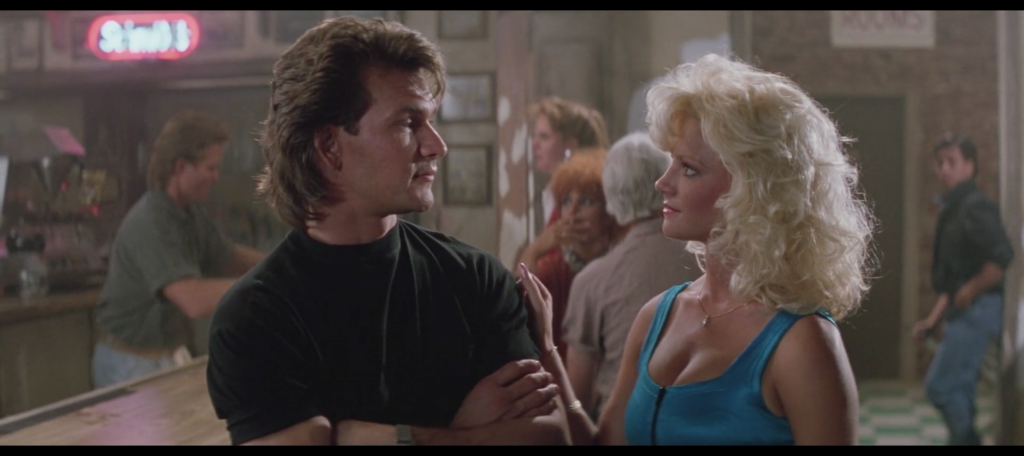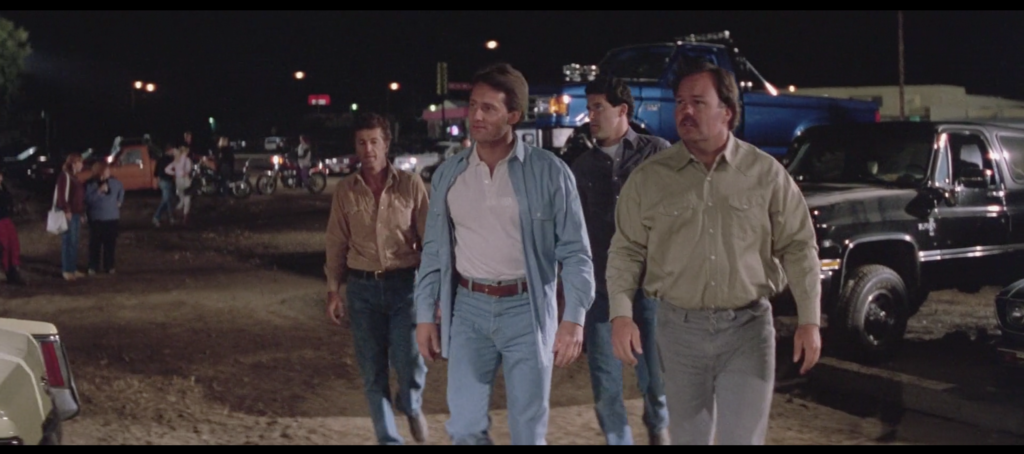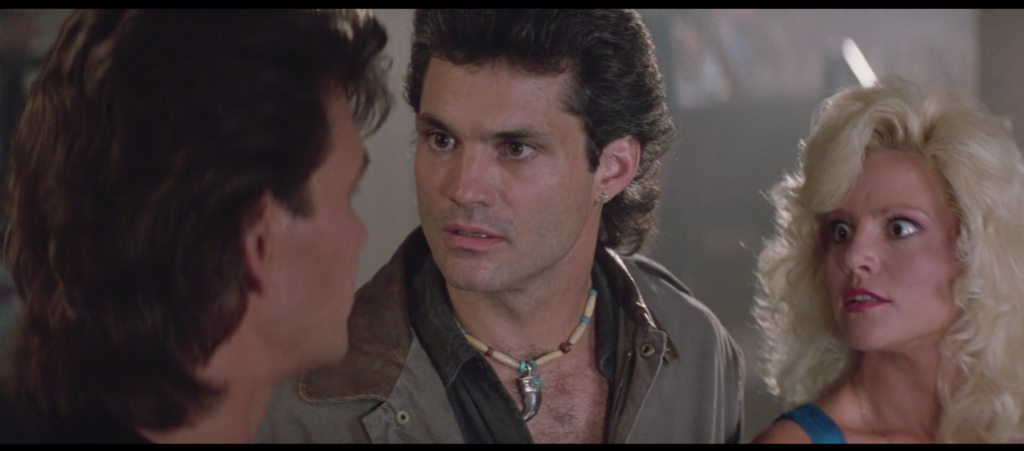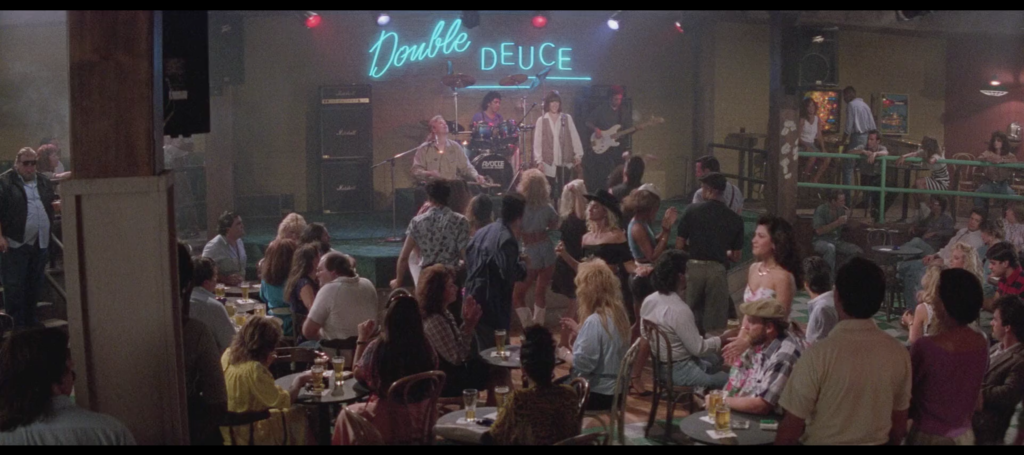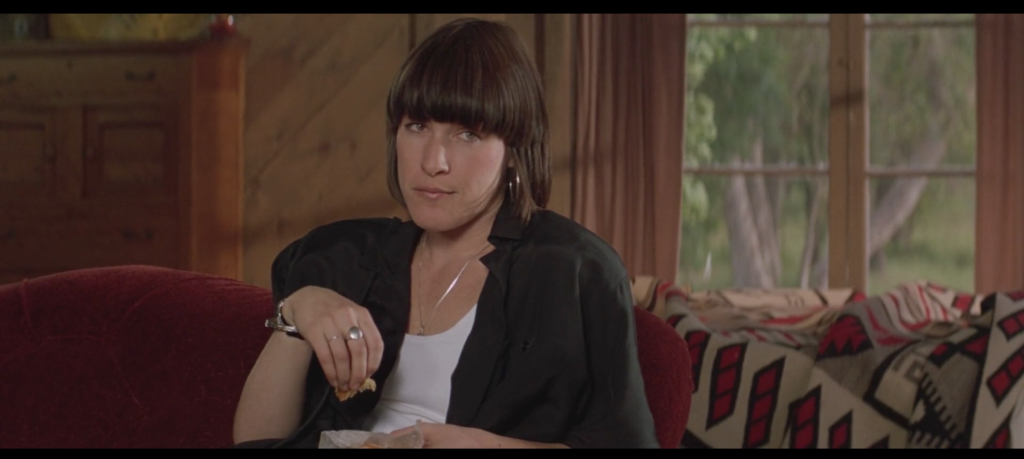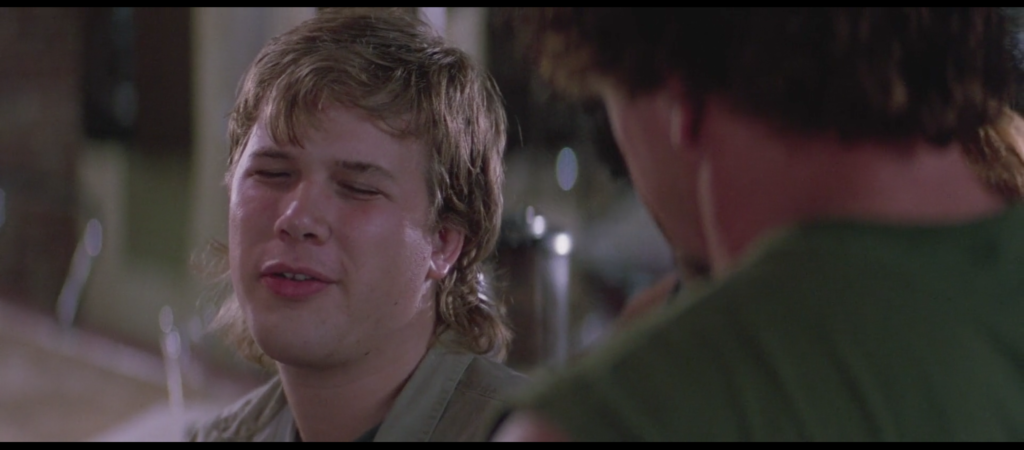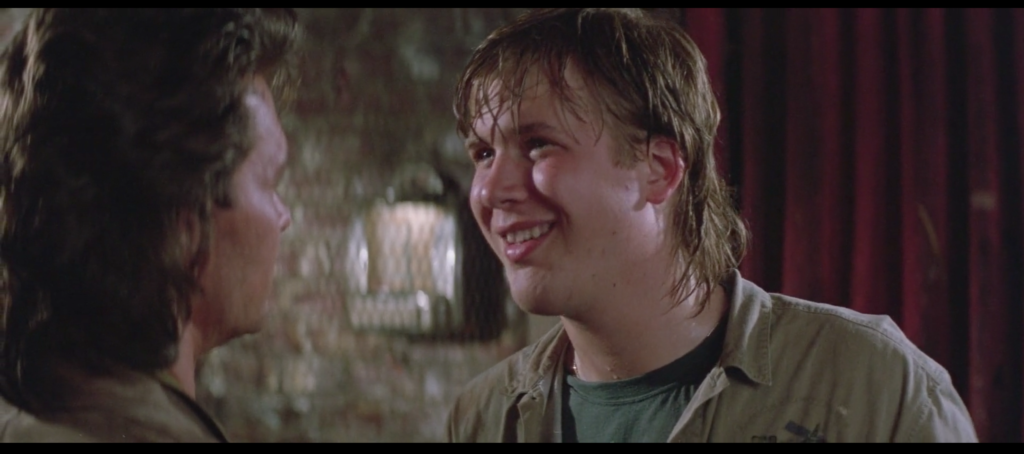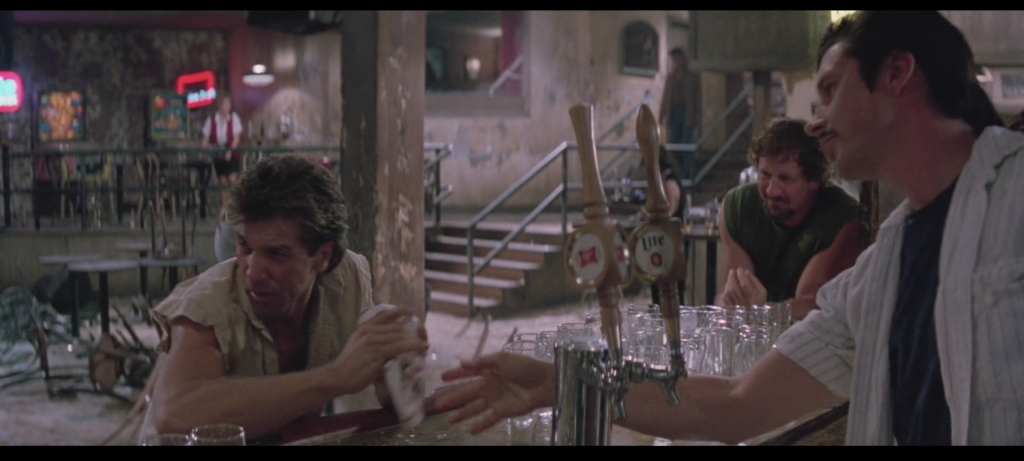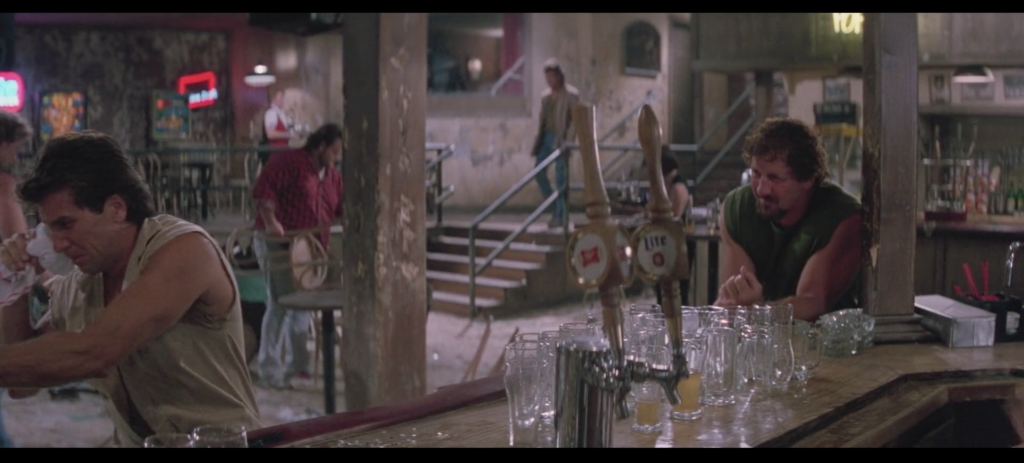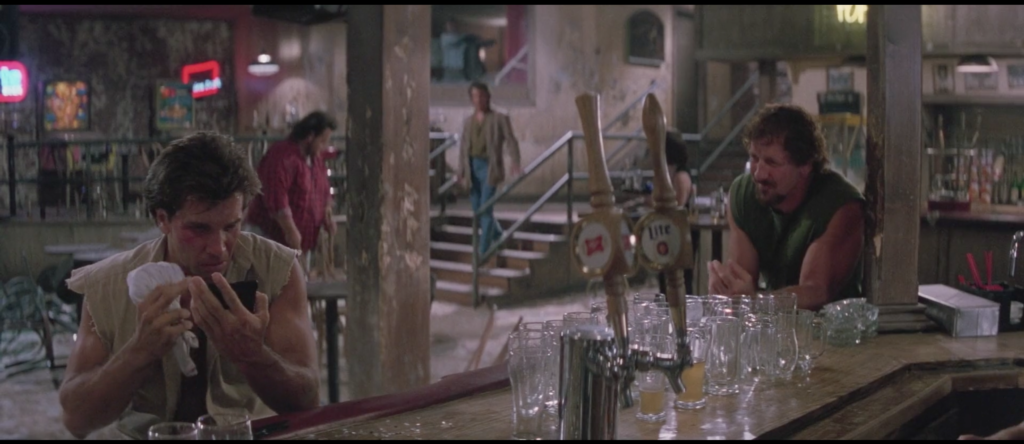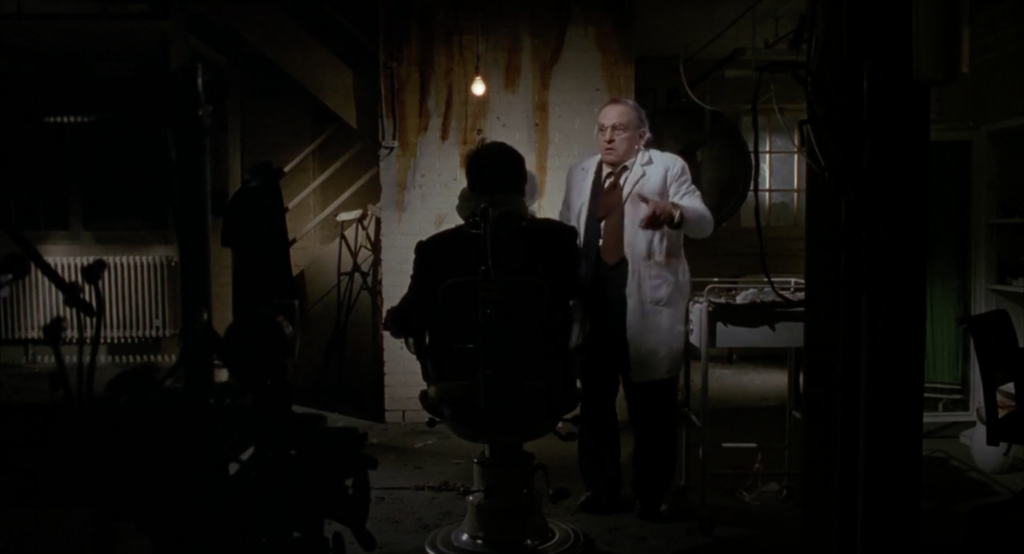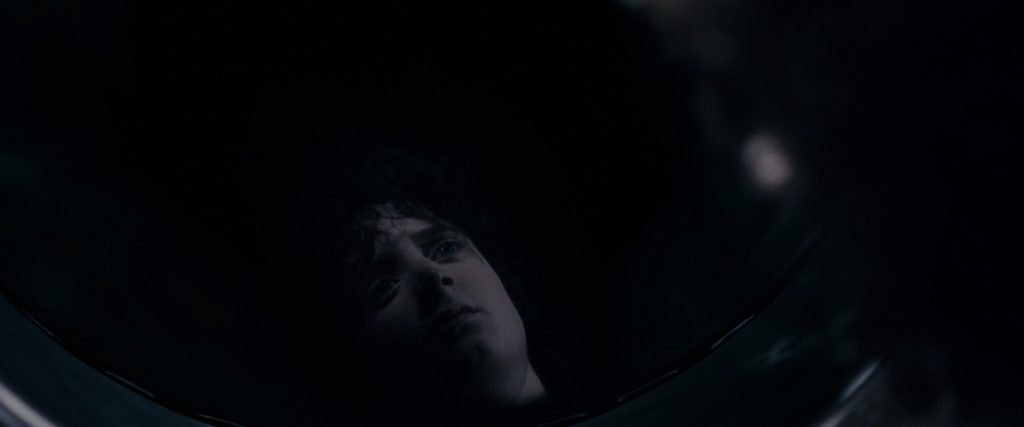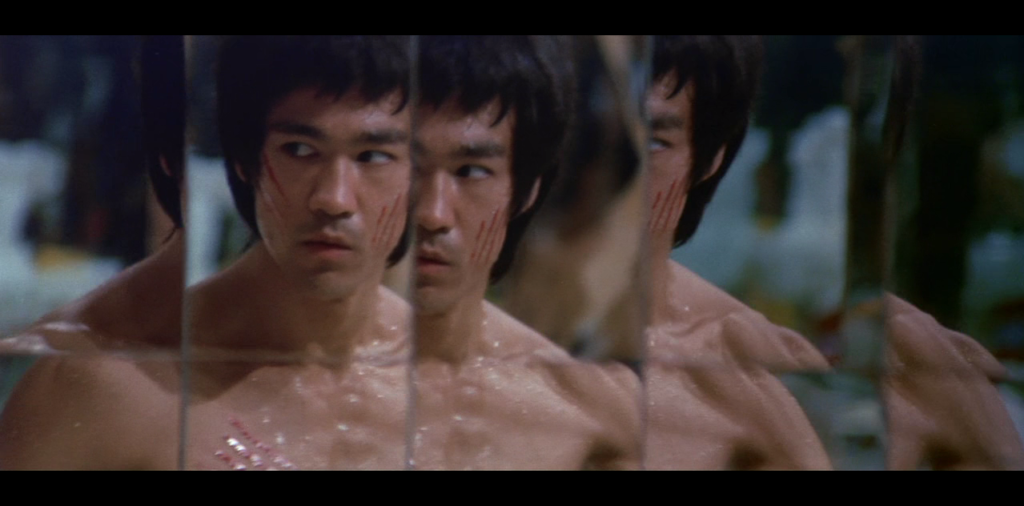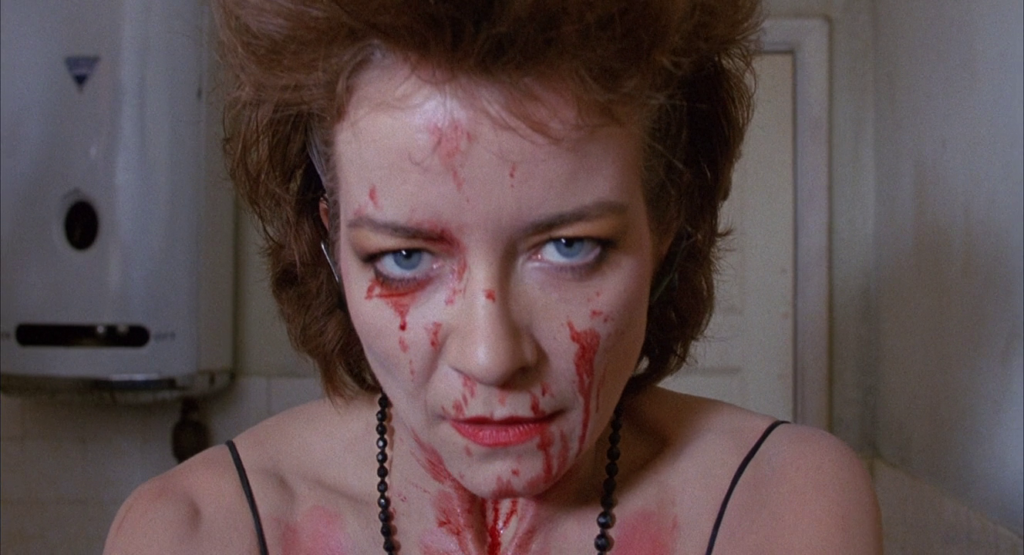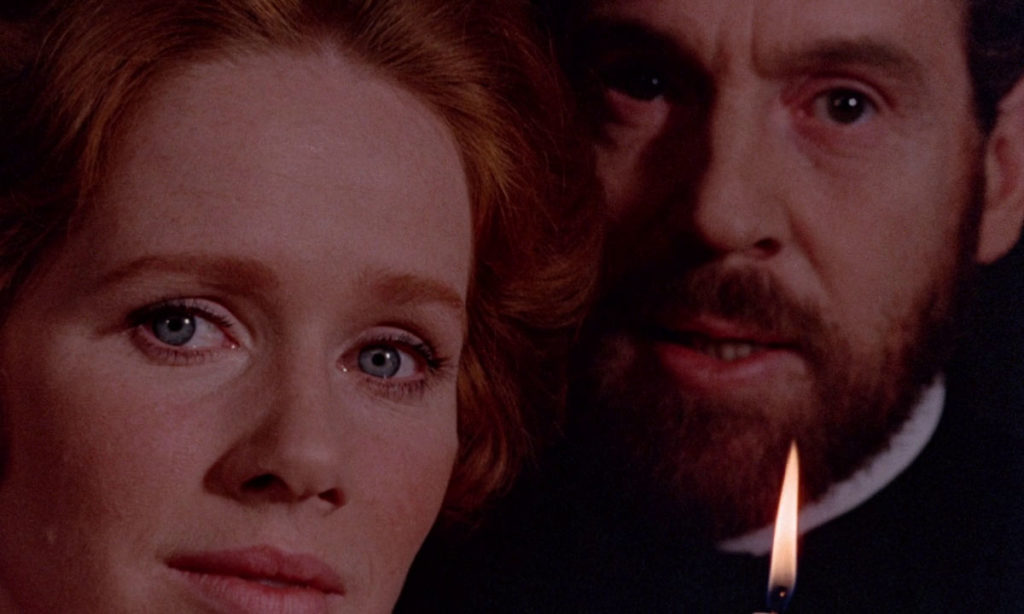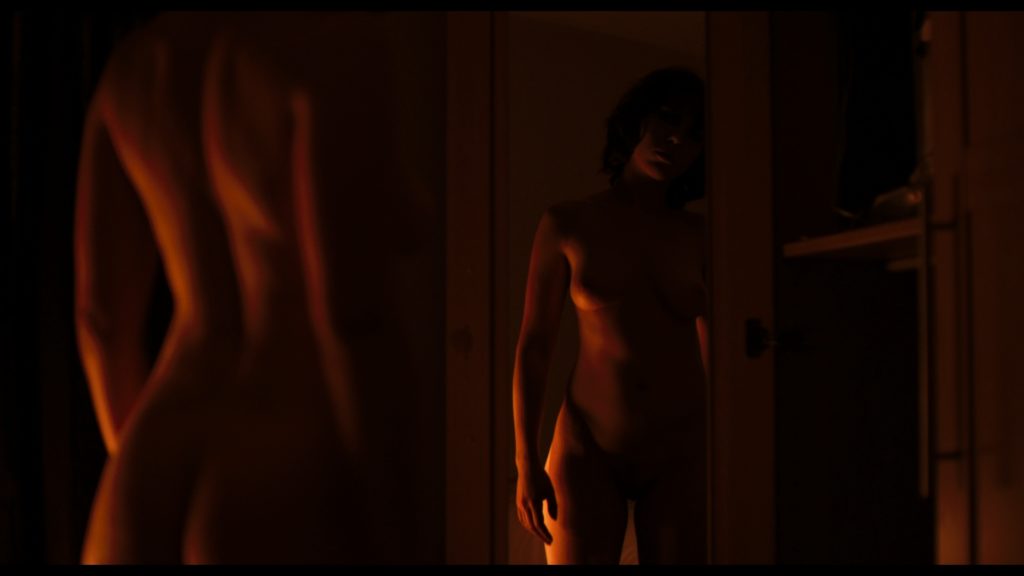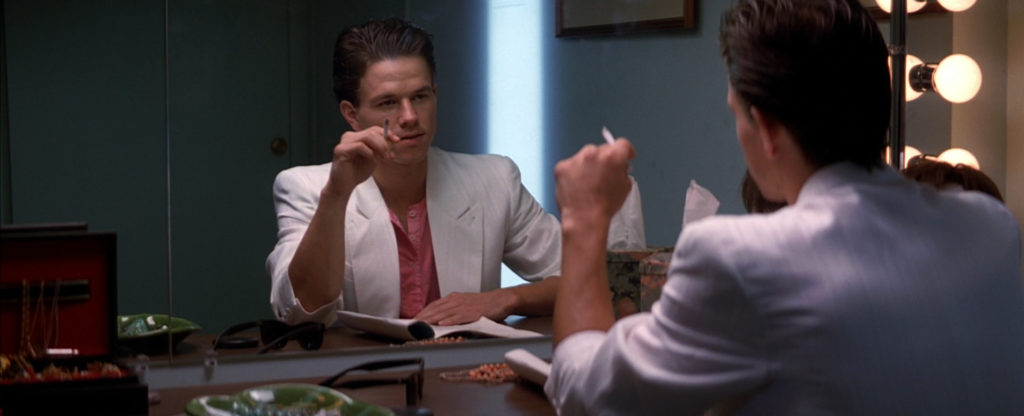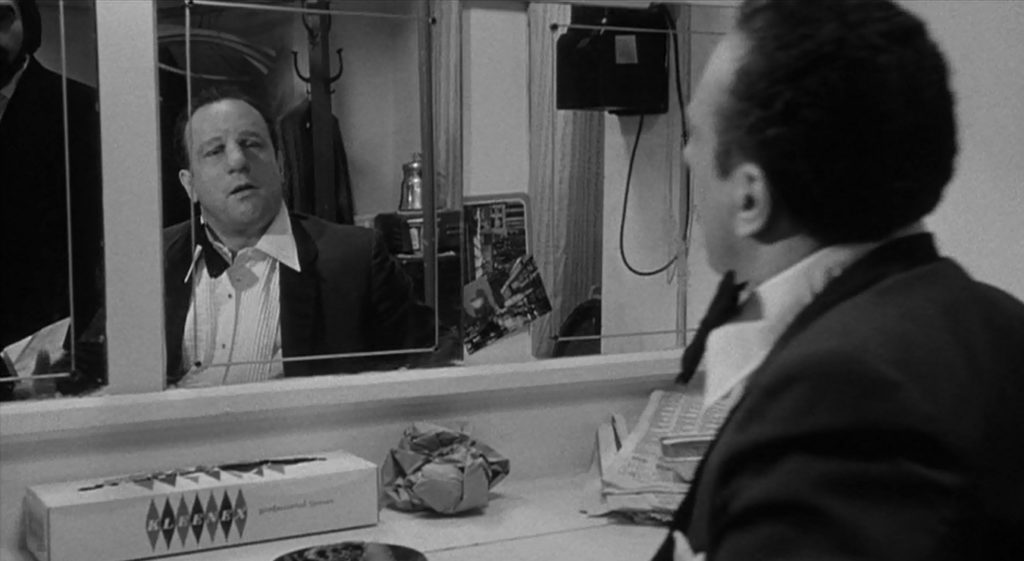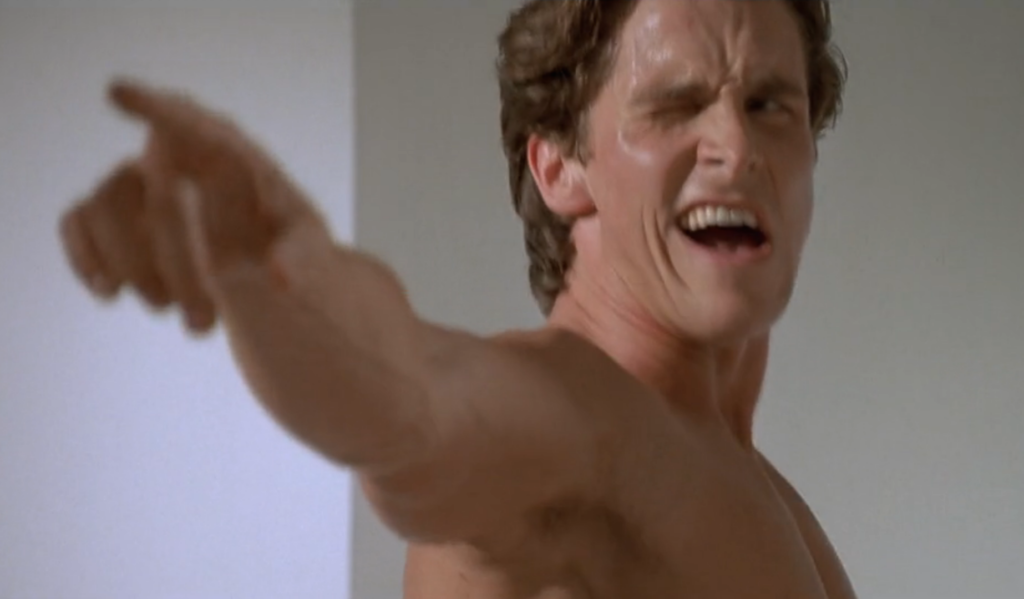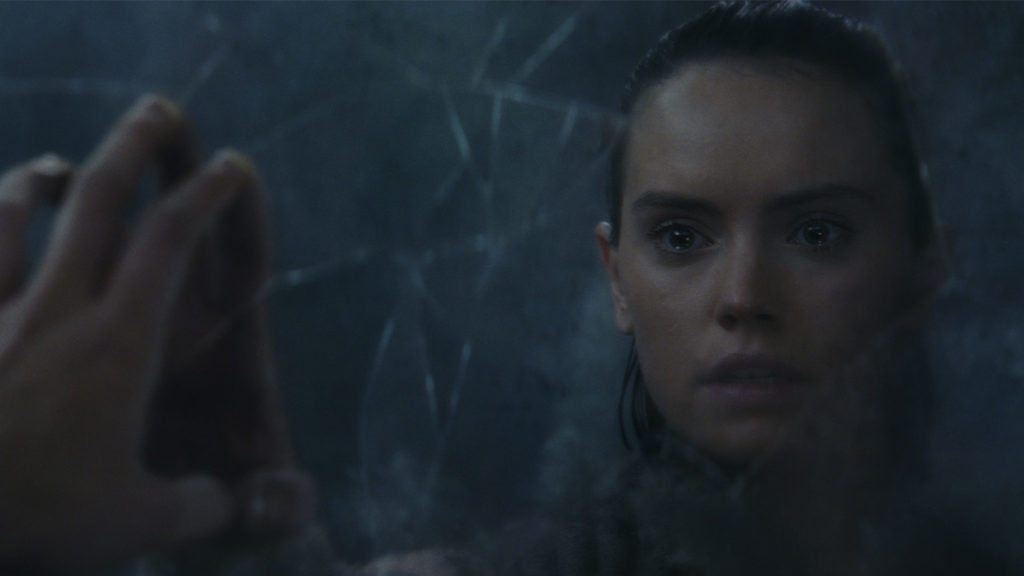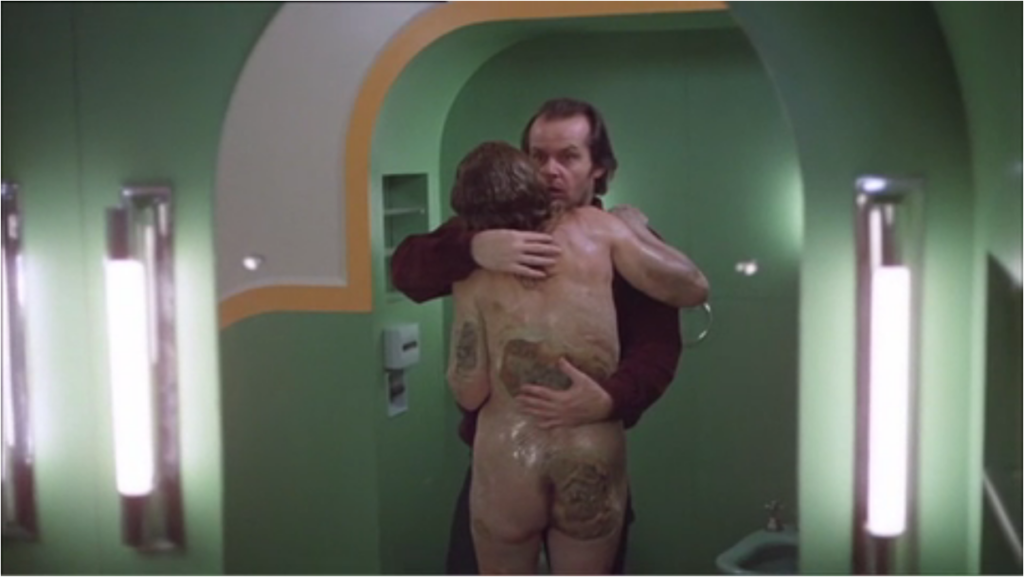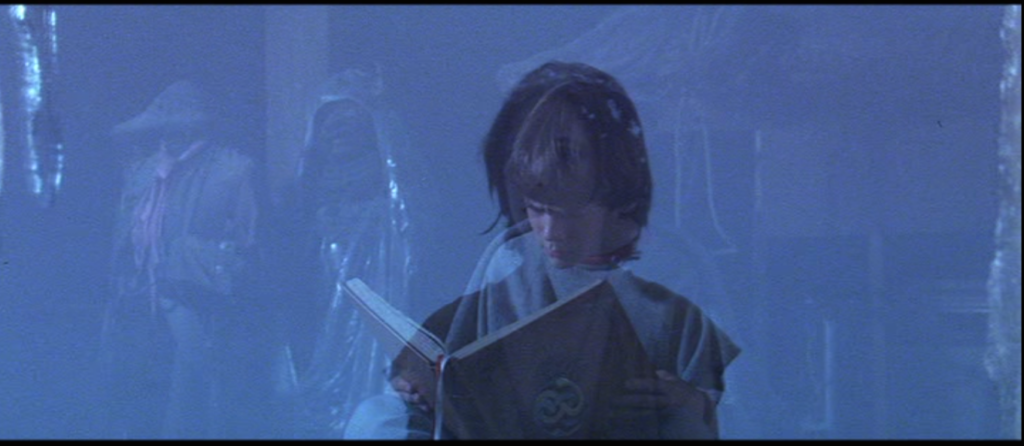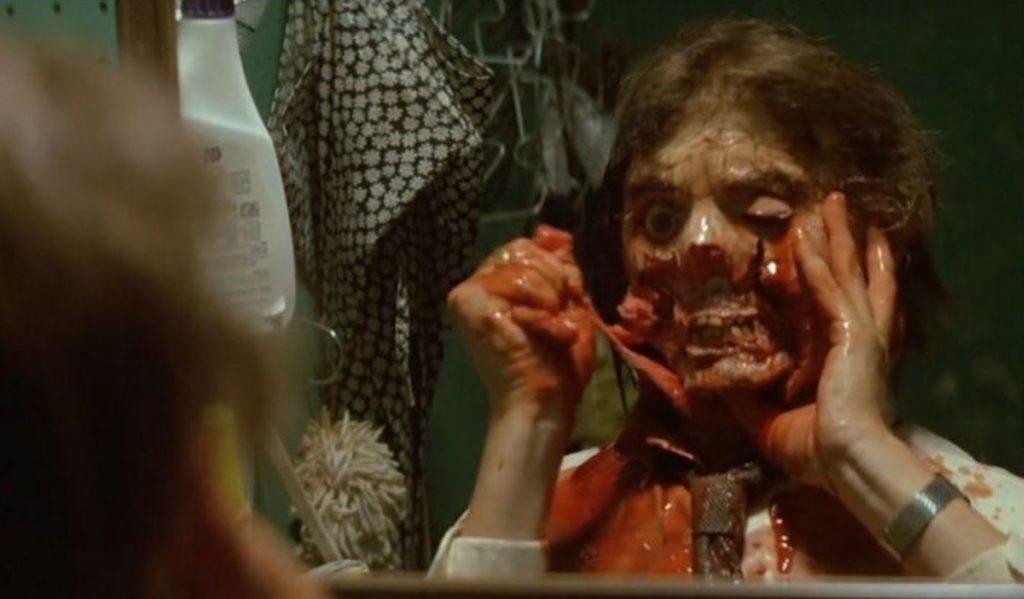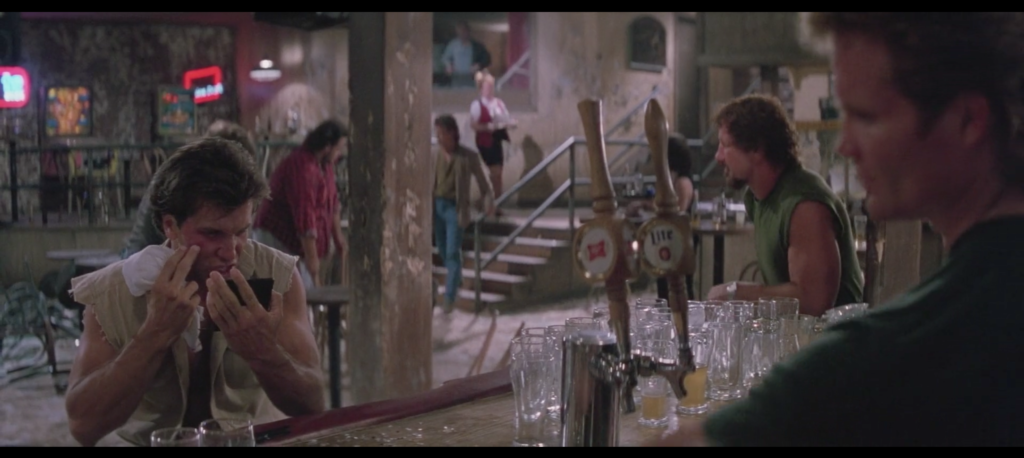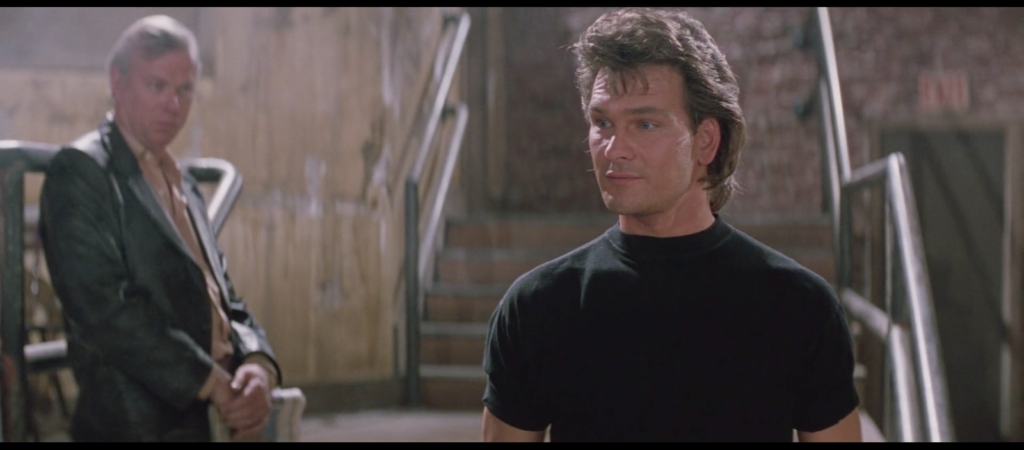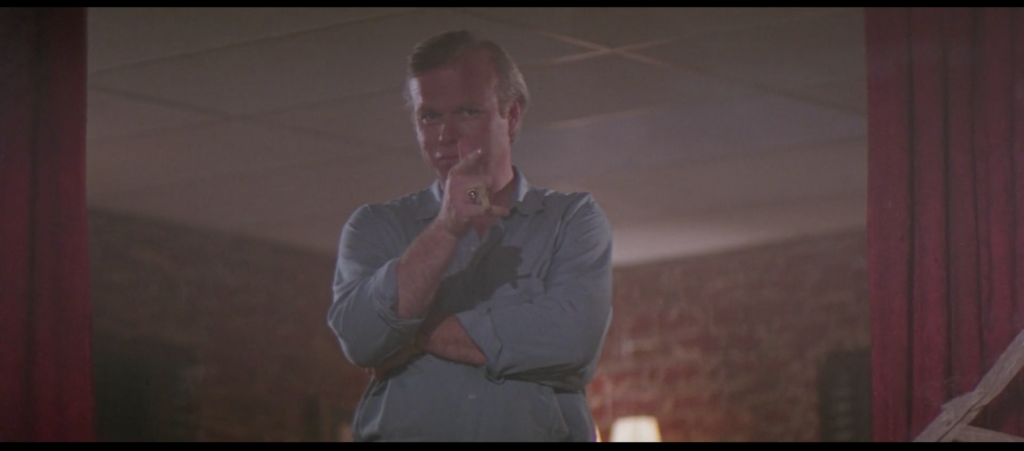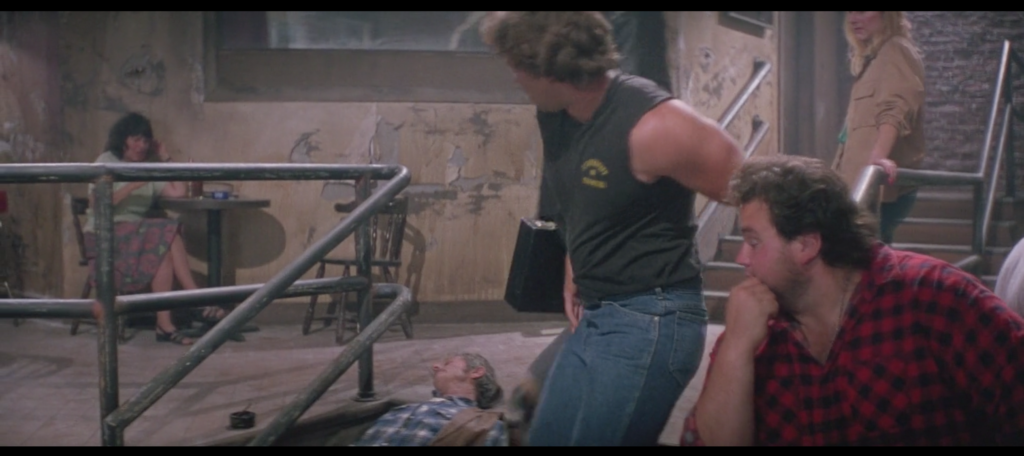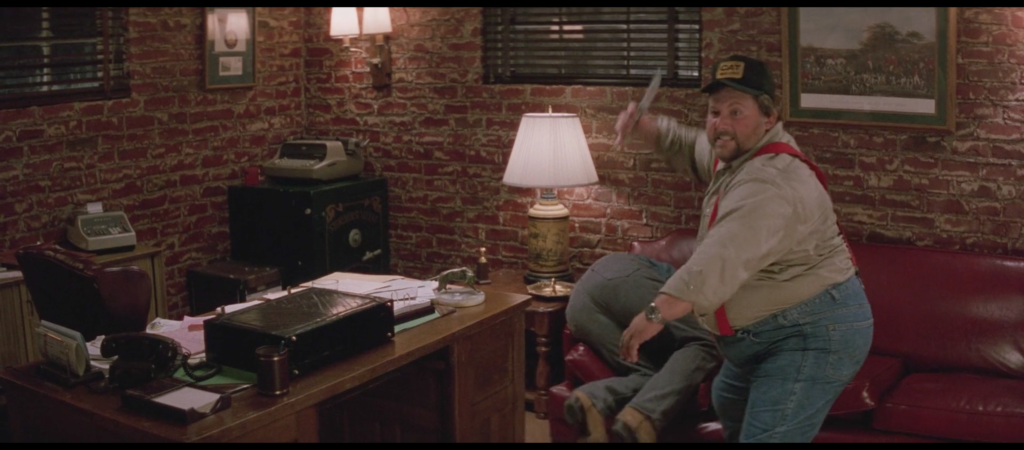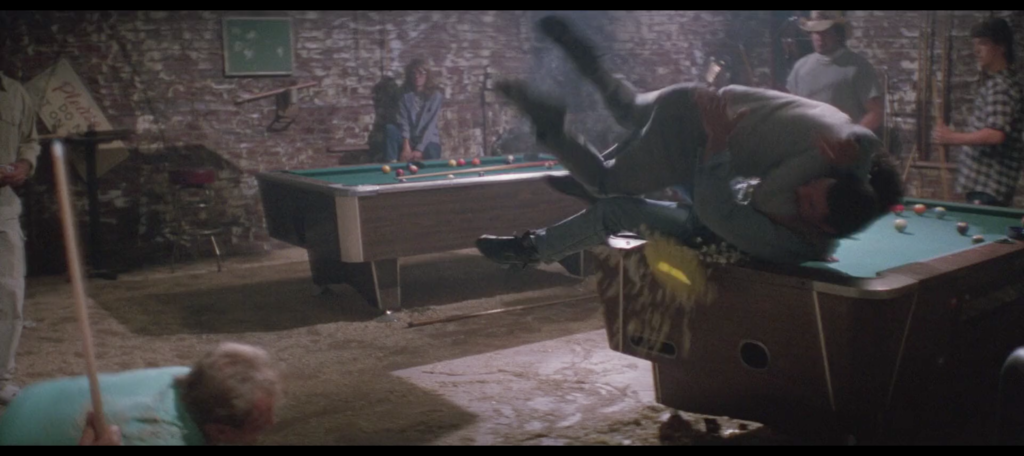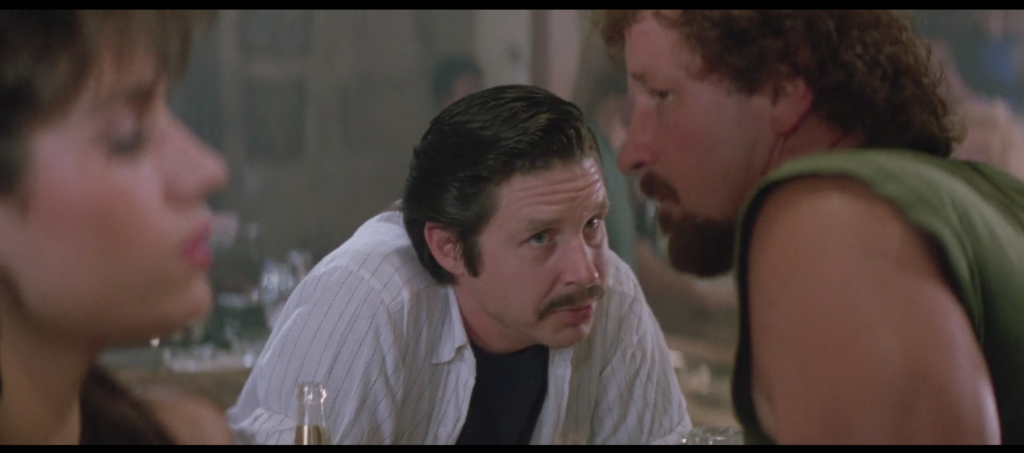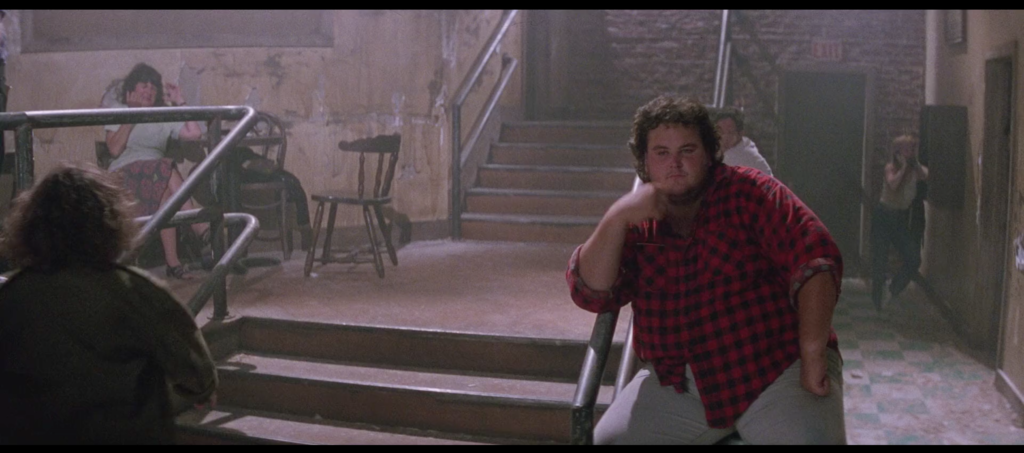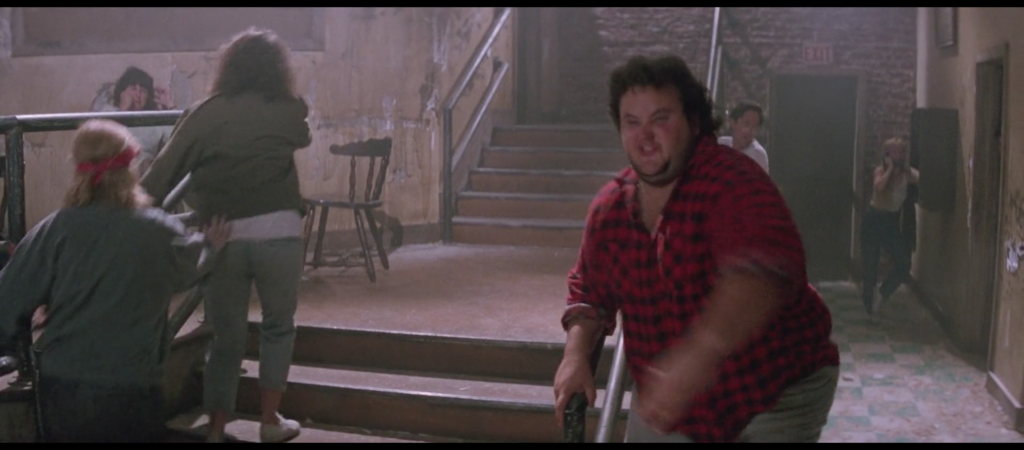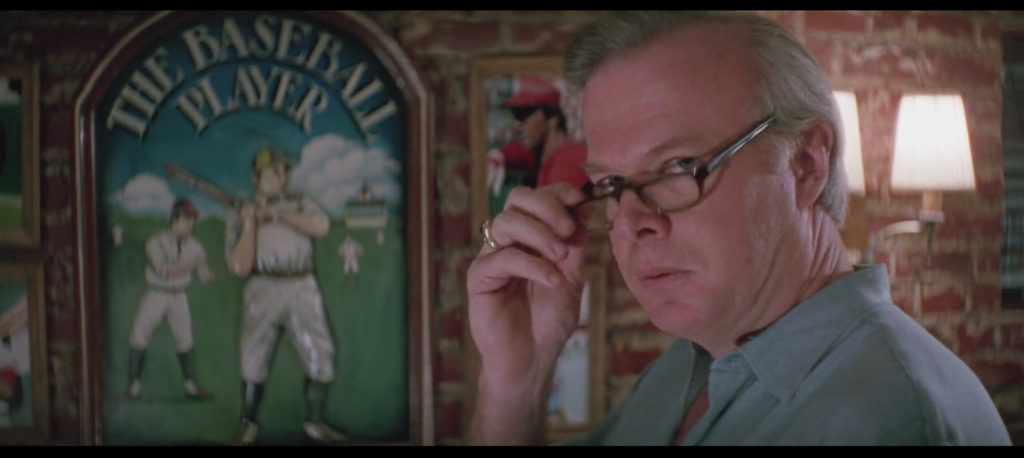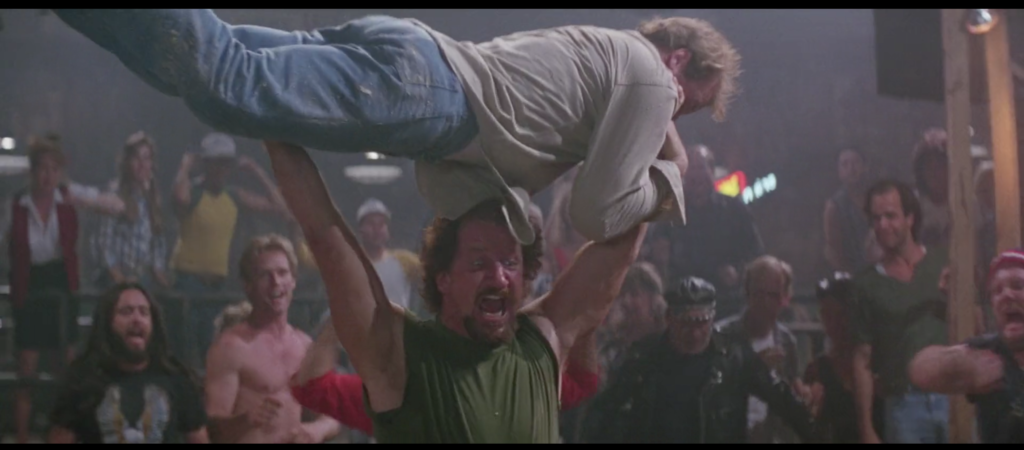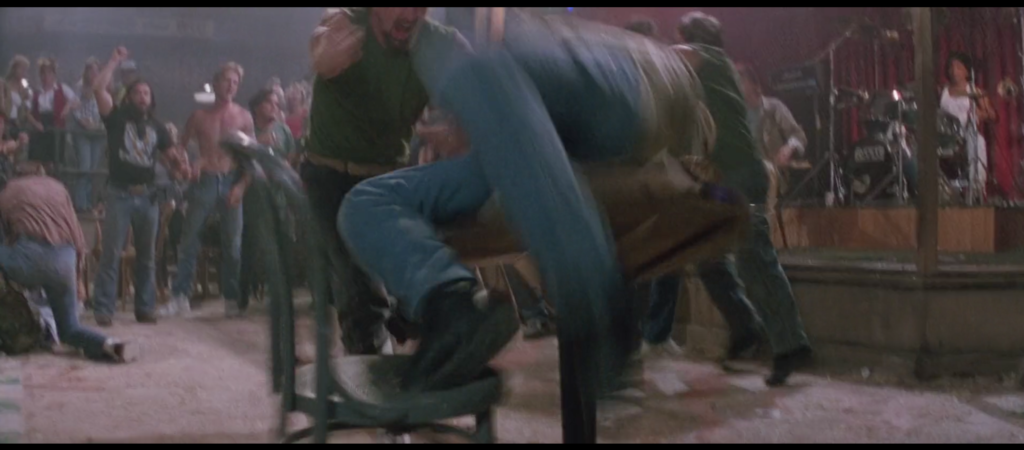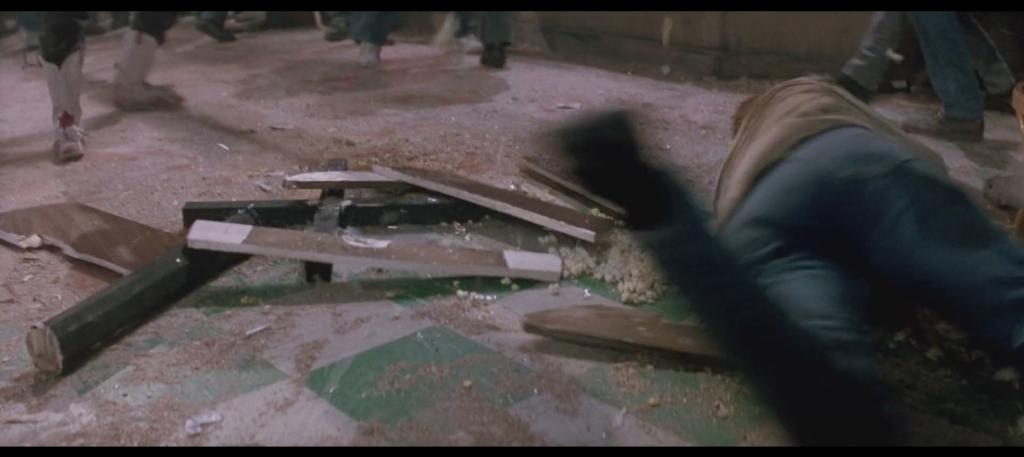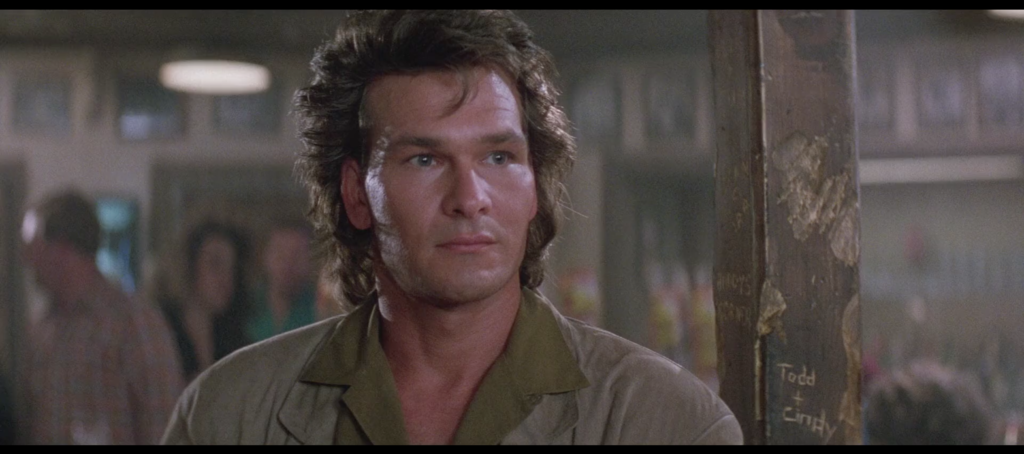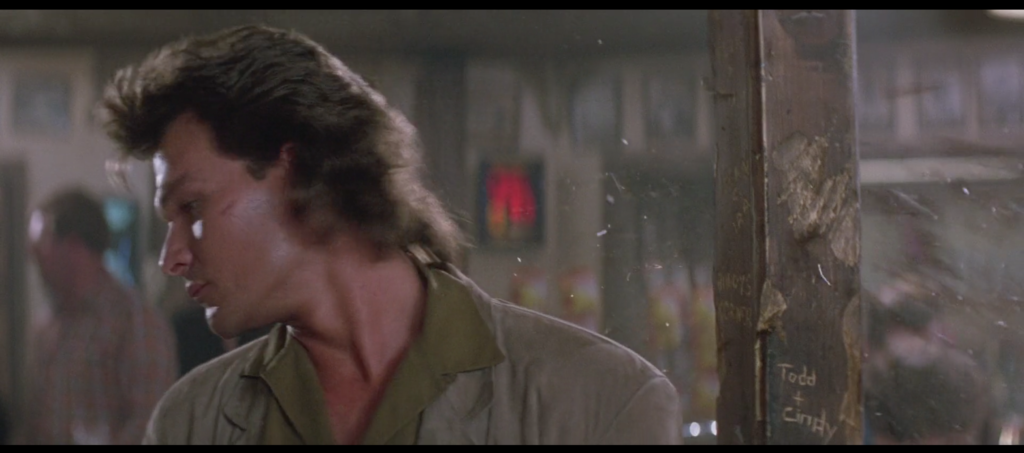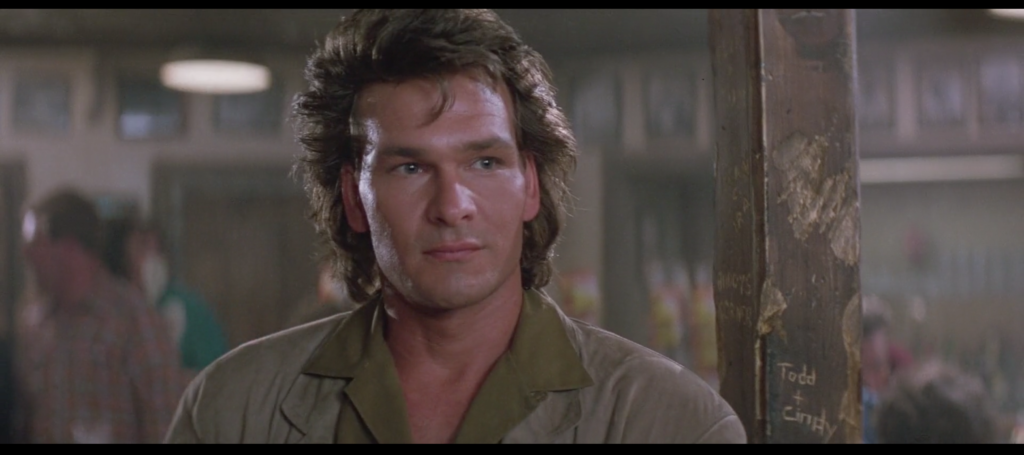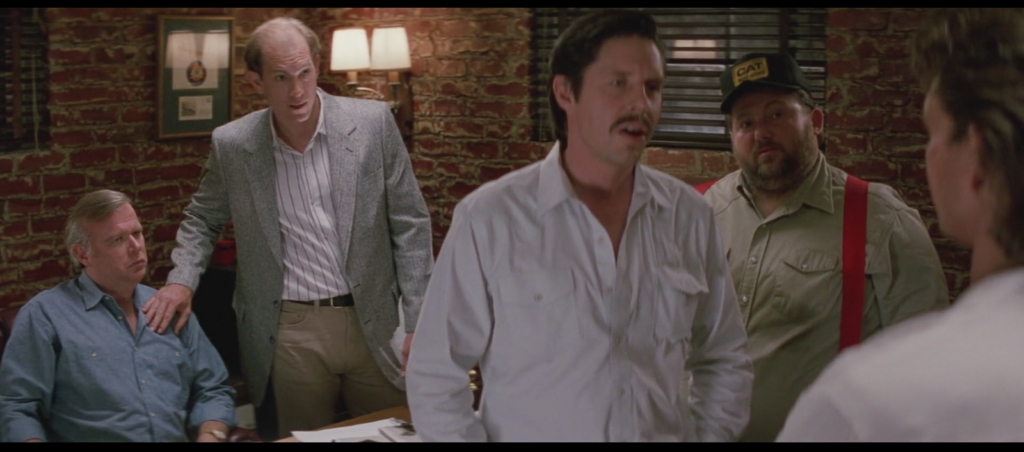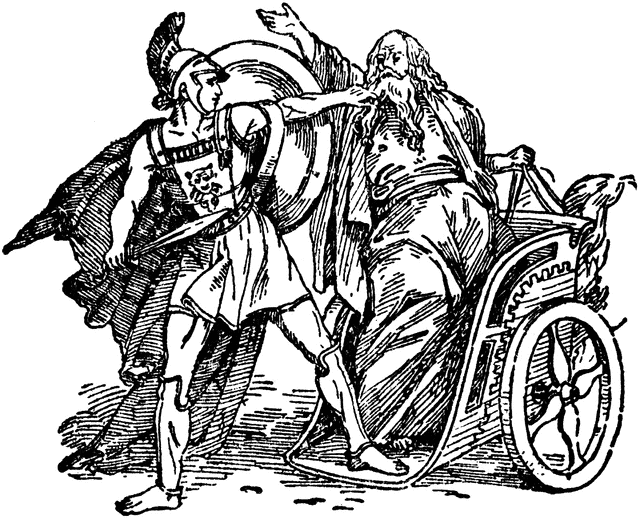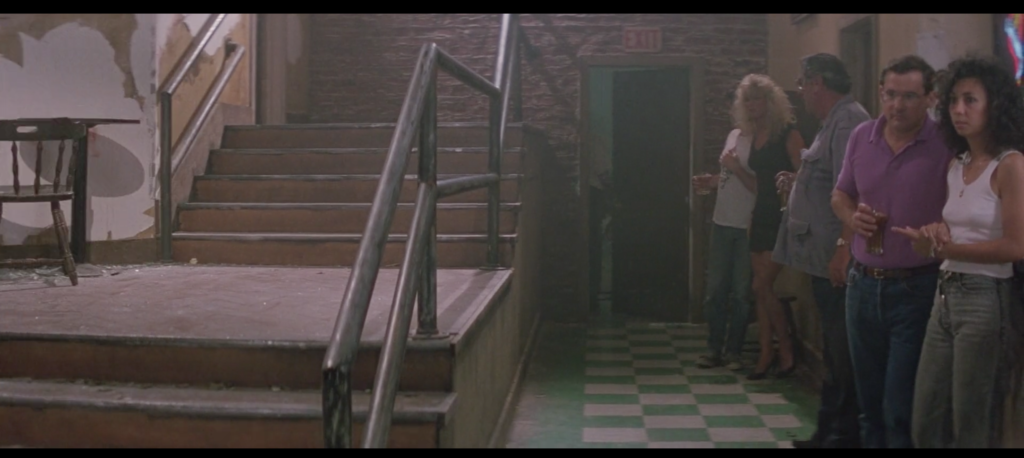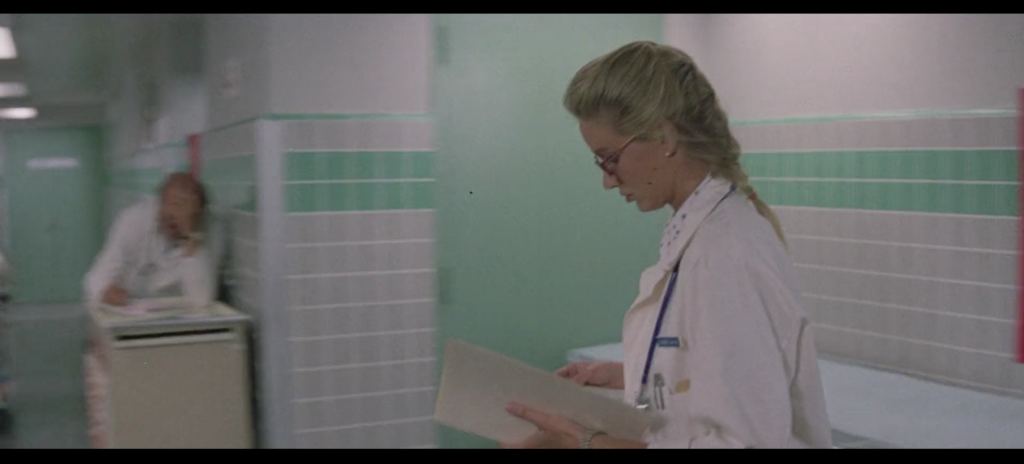Posts Tagged ‘the double deuce’
127. Earth-Denise
May 7, 2019I think it’s only natural to look at this image of Dalton and Denise, Denise sidling up to Dalton to cheerfully and in fact thoughtfully proposition him for sex and Dalton preparing to rebuff her pretty much no matter what she says, and focus on the hair. Those two glorious manes, brown and blonde, male and female, yin and yang, equal and opposite, an Aqua Net Argonath. Do they not suit each other, complement each other, mirror each other? By the end of this film you’ve seen both of these people mostly naked and once you cross that threshold—well, brother, we’re all adults here, and given what’s gone on in the back room of the Double Deuce already I don’t see the percentage in beating around the bush—you want to see these two people fuck. I sure do!
But I want more.
Oh, things work out fine in the Dalton/Doc timeline, for sure. Not for Denise, who gets beaten by Brad Wesley and then does an aggressive striptease on his behalf and then gets ridiculed by Dalton and dragged away and never seen again. And of course not for Brad Wesley and his men, who all get murdered, so hey, maybe things work out fine for Denise after all. But for Dalton and Elizabeth, you know, they find true love, Dalton turns a personal corner and quits cutting and running and gets over his guilt and trauma from the last time he murdered a guy, they have a bunch of no-nonsense sex in there somewhere, the Double Deuce and Jasper are freed from the tyranny of Brad Wesley, and regardless of where you come down on Frank Tilghman the movie implies this is a good thing so let’s go with that.
But sometimes I imagine another world. In this world Dalton does go back to Denise’s place and fucks, it doesn’t kill him, he does even like it. First of all kudos to Denise for maintaining her own apartment or whatever, maybe she and the girls are roommates, it’s a fun situation like Sarah Connor and whatsername at the beginning of The Terminator, just independent women of the ’80s living their dreams, there’s a lot of snickering and giggling when Dalton and Denise offer perfunctory greetings to them while they watch The Golden Girls and then fall into her room together. Second maybe it accelerates the timeline vis a vis Jimmy, Wesley’s top goon and illegitimate son (source for this claim?), who tells Dalton to say Goodnight, Denise. Maybe Dalton actually does say “Goodnight, Denise” in response and it really humiliates and angers Jimmy the way Dalton’s mildest comebacks seem to snap the likes of Morgan and Steve like dry twigs, and so Jimmy participates in the fight that follows with Ketchum and the anonymous goons who look like they’re dressed for Sunday services at a midwestern evangelical church. Maybe this fight is a real backbreaker for Dalton and Jack and Hank and Younger now because it’s five on four and at least two of the participants are pretty dece at fighting or would be if Dalton hadn’t yanked one’s boot off and twisted his ankle and hauled him into the parking lot like a sack of potatoes, but regardless we later see Jimmy beat Jack and Hank and Younger and damn near Wade and Dalton too before Wesley calls it off, so it could get rough. And let’s say Denise finds that boot with the knife in it that Dalton threw, technically we never see where it lands, and she sneaks up behind Jimmy as he’s about to deliver the coup de grace on Dalton and just fucking brains him with it, you see the lights go out right in front of you, it’s kind of horrifying but this abusive psychopath had it coming. And the rest of the goons fuck right off and yes I’m sure Wesley would go absolutely ape shit considering his bastard (?) just got done by his girlfriend, but guess what Brad? She’s not your girlfriend anymore, nope, she’s busy having Dr. Elizabeth Clay who showed up just in time to watch Dalton fall into the arms of another woman treat his wounds. And it’s a touchy thing for a while, what with the police in Wesley’s pocket and now there’s kind of a love triangle developing, and Brad’s acting rashly now, he’s not timing the explosives right for Emmett and Red because it’s like Tinker or O’Connor placing them rather than Jimmy and for all I know maybe Strodenmire gets run over along with his car dealership this time because Ketchum can’t sleep because all he can see is Jimmy’s vacant eyes with his boot embedded in his brain and he’s doesn’t give a fuck who gets hurt anymore because it’s hard to feel anything. But who should ride into town to help Dalton put down this pack of mad dogs but Wade Garrett, just like he always has, and even if Red and Emmett and Pete are all dead this time around there’s still Wade to pull the trigger and save his mijo from becoming what he’s always dreaded, he’ll be his sin-eater and that’s fine, and the Double Deuce will be fine, and Jasper will be fine, and yes Wade comes on to Denise pretty heavy but wouldn’t you know it, this time around Dr. Elizabeth Clay is not spoken for, and the red fucking hot sexual chemistry between the two of them combusts and they’re fucking before you know it, everyone’s fucking up against walls, left and right, like rabbits, because death’s thick in the air, it’s in their brains like a disease, and this is how you treat it, this is palliative care because you need love to feel alive, don’t you, you need to have love and make love to show death it hasn’t fucking gotten you yet, and Dalton and Denise who escaped her abusers and Wade and Elizabeth who escaped that abuser before are still alive and they say as they fuck and love each other goddammit we still have time on this earth and we’re going to live, live, live, live, live, live, live, live, live.
126. Thug casual
May 6, 2019Look at this sorry state of affairs. Look at what the goon industry in Jasper has become. This fearsome foursome have stepped right out of a Promise Keepers meeting and into the parking lot of the Double Deuce in an attempt to assassinate Dalton by kicking him in the head with a knife. The denim bandit taking point is Ketchum, obviously, as you’ll recall from previous posts about Road House‘s most anonymous and yet also for some reason ultimately most prominent goon. The other three guys…well, they’re stuntmen, that’s the easiest way to put it, stuntmen who have no lines and appear in no other scenes and are only there to have a dust-up with Dalton and his bouncers that will leave their acid-washed asses in the dirt.
Tinker and O’Connor have better luck than these clowns do in taking Dalton on, as a matter of fact. Yes, in the previous fight Pat McGurn gets his nose broke and his ass kicked through a plate-glass window before he so much as lands a blow, though for attempting to carve Dalton like a Christmas ham with a knife the size of his forearm he should at least get an E for Effort. But Tinker comes close to killing Dalton, and he and O’Connor work both Dalton and Tilghman over pretty good before Dalton regains the upper hand against the Bleeder and the other bouncers team up on the big man.
Ketchum and company? Dalton and Jack spot them coming from a mile away. They post up with Hank and Younger just inside the vestibule and block these dopes from getting in. Dalton catches Ketchum’s would-be deathblow, violently twists the guy’s ankle, then literally drags his ass out into the parking lot. There’s some back and forth out there I suppose but there’s no reversal to speak of, where the bad guys are winning but then Dalton stages a comeback. Nope, they just go at it until the bouncers defeat the goons one by one. Ketchum is reduced to shouting “You son of a bitch!” as he’s dragged away with just one boot on, since Dalton lobbed the other one up on the bar’s roof, like Walter White with the pizza that one time. Just a disgraceful performance from top to bottom.
Ketchum, as we’ll see, returns with a vengeance, but these other guys are never seen again. After their work tonight, it’s entirely possible Brad Wesley beat them all to death in his driveway while smiling wryly as his other minions looked on and chuckled. Or perhaps after that they drifted East to perform other tasks in Wesley’s service but were never heard from again by the main characters, kind of like the Blue Wizards from Tolkien before Christopher revealed he’d revised their origin and made them part of anti-Sauron activity in the Second Age instead of the Third. (Seriously, apparently Professor T wound up deciding they came over from Valinor with Glorfindel now rather than Saruman, Gandalf, and Radagast. Blew my mind too.) My best guess, though, is that they simply went back to their day jobs at the Bass Pro Shop in the new mall. Take another look at those faces and tell me you wouldn’t be able to get a hell of a fly-fishing lure recommendation out of every man jack of them. They couldn’t possibly fuck it up worse than they fucked up being goons, I can tell you that much.
124. Say Goodnight Denise
May 4, 2019We’re near the midpoint of the movie now and things have turned around for the Double Deuce. The thugs, thieves, dope dealers, and dudes who fuck high-schoolers have been purged—and that’s just from the staff. The bad element in the crowd has had its proverbial face smashed through the metaphorical table. The first attempt by the Brad Wesley organization to re-exert control by forcing the rehiring of sister-son Pat McGurn ended in a defeat so humiliating that Wesley beat up one of the already beaten men himself upon hearing about it. Carrie Ann has gone from getting groped and forced into fistfights to getting on stage and banging out blue-eyed soul versions of “Knock on Wood” with the Jeff Healey Band. There’s a neon sign now. The floor and walls are clean of dirt and graffiti. The dance floor is jumping. The damned chickenwire is down. It’s a new day.
Denise must agree. Not that we know her name is Denise at this point. She’s just the vivacious blonde with a sense of style who rebuffed a dude who asked her to get “nipple to nipple” a while back, and who looks at Dalton like J. Wellington Wimpy looks at hamburgers. Today is the day she makes her move.
No bizarre “nipple to nipple” euphemisms that are actually filthier than the real thing for Denise, oh no. Gliding over to Dalton’s usual post-up spot near the bar, she gets, well, nipple to nipple with him, rubs his shoulder, asks him why he avoids eye contact with her (“I’m shy”), and says “Would you be shocked if I said ‘Let’s go to my place and fuck’? Ain’t gonna kill you. You know, you might even like it.” Show me the lie, you know?
Dalton, who has an inscrutable but distinct sense of decorum that I’m still puzzling out 124 days into writing about him, seems unimpressed (or blind) and unlikely to accept the offer. But the matter is taken out of his hands. Appearing from out of nowhere, Brad Wesley’s chief goon Jimmy violently grabs Denise by the arm. Whipping her behind him and thrusting himself into Dalton’s face, he growls “Say goodnight, Denise,” and they leave.
But he doesn’t say “Say goodnight, Denise” while looking at Denise. He says “Say goodnight, Denise” while looking at Dalton, and I mean looking at him, staring right into his eyes like he’s trying to psychically bore two holes through his skull. He says “Say goodnight, Denise” as if he’s telling Dalton “Say ‘Goodnight, Denise.'”
Given Dalton’s penchant for cheap sarcasm when the opportunity presents itself, and given Road House‘s penchant for dumb jokes whether the opportunity presents itself or not, it’s hard to believe, but no, Dalton does not stare right back into Jimmy’s face and say “Goodnight, Denise.” But their loss is your gain. You can be Dalton’s voice in this moment. You can say “Goodnight, Denise.” Your quick wit will delight all who have the pleasure of your company. Goodnight, Denise.
123. Chicken wireless
May 3, 2019Dalton purged the staff of the Double Deuce of its criminal element.
Dalton purged the crowd of the Double Deuce of its criminal element.
Dalton defeated the minions of Wesley in open combat.
Dalton liberated the small businessmen of Jasper, Missouri from the Jasper Improvement Society.
Dalton saved the life of yeoman rancher Emmett.
Dalton put the minions of Brad Wesley down like dogs, one by one.
Dalton lulled Brad Wesley into a false sense of victory that enabled the small businessmen of Jasper, Missouri to gun him down.
Dalton taught the bouncers of the Double Deuce to walk the Dalton Path.
Dalton taught Dr. Elizabeth Clay how to love again.
Dalton freed Jasper, Missouri from tyranny.
For these deeds we honor him.
For these deeds we celebrate him.
But through his efforts, Dalton also freed the Jeff Healey Band from the loose-hanging confines of their chicken-wire prison.
And it is for this deed that we dedicate our lives to his service.
So was it nice. So is it nice. So ever will be it nice.
In the name of the Dalton, the Jack, and the Holy Wade.
Amen. Amen. Amen.
—from the Most Meet and Worthy Charter of the Holy Jasper Empire, Forty-Fifth Post-Tilghman Schismatic Revision; So Decreed by the Ass-Mother of the Sisters of Carrie Ann and the Eternal High Priestess of the Elizabethan Order; So Ratified by the Intranuclear Auto Sales Consortium, the Swords of Tinker, the Swords of Denise, the Cody Navigators, and the Guild of the Valet Visible; Sworn by the Blood of the Bleeder, Jasper IX, AD 7201
108. Dead man revisited
April 18, 2019“You’re a dead man,” Morgan tells Dalton when he gets fired. Carrie Ann, Morgan’s now-former coworker, may not share his idiosyncracies regarding where to place the emphasis when speaking, but she does share his sentiment.
The morning after Dalton’s momentous first night in the Double Deuce’s employ, Carrie Ann heads over to his luxury barn to feed him breakfast and, lucky for her, see his bare ass and reenact that gif of Ariel the Little Mermaid leaning on a rock as a huge gush of water erupts around her as a result.
But she brings business to go along with her culinary and visual pleasure. Firing Pat McGurn, one of the Double Deuce’s bartenders, is something Dalton should not have done, she tells him. As a mostly mute (but for grunting and an admittedly sincere-sounding “thank you”) Dalton sits down with a lit cigarette in his mouth and no shirt on his torso, disgustedly tossing aside the bacon and egg sandwich or whatever it is she brought him and moving in on the coffee, Carrie Ann starts cracking up while saying “Oh my god.”
“What is the joke,” Dalton asks, sounding like a cop on a TV show who just got a call at 3:30am saying there’s been another homicide down at the docks.
“Well, there’s no joke,” Carrie Ann says. “I just think I’m looking at a dead man, though.”
“Seems everywhere I go I hear that same joke,” Dalton mutters, shaking his head.
“Yeah? Well, something tells me you bring it on yourself,” Carrie Ann says saucily, nibbling on her breakfast in eating the popcorn/sipping the tea mode.
The variation in affect between the two actor makes it tempting to write this scene off as a minor bit of light-comedy character building. Dalton, who is hung over from a long night reading A River Runs Through It, is gruff and world-weary, too tough to worry and too tired to care. This is just how he lives his life: an endless cycle of naked wake-ups, shirtless stretching, cigarette-flavored coffee for breakfast, some tai chi or perhaps hitting the heavy bag for a workout, grabbing an unstructured jacket, heading to work to get stabbed by various men in the course of kicking their asses, repairing the damage done to his car by those men on their way off the premises, driving back to his luxury bachelor pad right next to the horse pen, taking off his shirt, reading a book, spying on Brad Wesley’s in-ground pool orgy, and finally doffing his jeans and hitting the sack. If during the course of those events people pronounce him a dead man, it’s a job, it’s nothing personal. And Carrie Ann is just the platonic female foil, the funny best friend, who’s able to poke holes in his machismo but not actually call his narrative into question or anything of that threatening nature.
But Carrie Ann, the drinking man’s Cassandra, also knows well that the only person who can truly save Dalton is himself. A warning out of professional courtesy, a gesture of solidarity with a new friend, an excuse to go over to the hottest guy in town’s place—it’s probably all three of these things. But in reality what he’s saying is “I can’t help being what I am,” as a stoic positive; she’s saying it too, but as a cheerily black-comic negative. Worst of all, it’s a direct challenge to the Rules. All that talk about expecting the unexpected, remembering it’s a job, it’s nothing personal, be nice until it’s time to not be nice, watch my back and each others’, and so on…earns him death threats “everywhere I go”? Okay dude, her twinkling eyes and cocked head seem to say, it’s your funeral. We’d expect no less of a dead man.
105. Fate
April 15, 2019One hundred essays into a year-long Road House writing project, I feel about the film’s attempts to coin catchphrases and aphorisms exactly the way I felt when I’d written no essays at all: yikes. I mean, Does a hobbyhorse have a wooden dick, folks. Balls big enough to come in a dump truck. The writers have a relationship with the English language only slightly less estranged than their relationship to male sex organs.
But they can’t all be losers.
Just after the dump truck incident, a grumpy Morgan (there is no other kind of course) stomps over to Cody, whom he knows has a preexisting relationship with their mysterious new colleague. “This Dalton character,” he grumbles, “what’s his story?”
“His story is, you fuck with him and he’ll seal your fate,” Cody replies.
Now that’s how it’s done.
It’s a marvelous exchange insofar as it’s a rare moment when two characters have a conversation during which Dalton is neither a participant nor present. These are few and far between in this film, to the point where they stand out like sore thumbs each and every time. Off the top of my head, there’s this conversation, there’s Brad Wesley beating up the bleeder, Wesley and Jimmy talking to Red briefly after Dalton departs his store, and Jimmy and Ketchum spying on Dalton and Elizabeth from afar. Unless you count Wade Garrett breaking up shenanigans at a strip joint prior to receiving a call from Dalton, or Wade Garrett asking for Dalton’s whereabouts when he arrives at the Double Deuce, or Wesley’s goons making small talk prior to Dalton’s final assault on the Wesley compound, or Steve and Agnes doing their regular Saturday night thing before Dalton pops in and fires him—all of them scenes that exist so that Dalton can join them in progress—that is it. This is Dalton’s world, and what a treat to see other people live in it.
And who are the people in question this time around? Blind white blues musician Jeff Healey and hardcore wrestling legend Terry Funk. For Road House fanatics this is like the De Niro/Pacino diner scene in Heat.
But don’t think it’s just some goofy novelty act. (I didn’t say “Don’t think it’s some goofy novelty act,” mind you, I said “Don’t think it’s just some goofy novelty act.) Throughout this project I’ve been impressed by what the…let’s say non-traditional actors bring to the table. The naturalism Terry Funk brings to his role as an enormous man who gets paid to get angry and beat the shit out of people with tables is obvious. But spare a thought for Jeff Healey, too, who sounds like exactly what he is supposed to be: a guitar player chatting with dudes in bars. It works when he’s serving as a welcoming presence for Dalton, the one character he neither needs to intimidate nor impress, and it works when he drops the “hey man lemme put this here guitar down and buy you a beer” schtick and describes his friend like he’s the fucking Shogun Assassin.
Because that’s the message of “you fuck with him and he’ll seal your fate,” isn’t it. He won’t just kick your ass, or kill you, or make you wish you were never born or blah blah blah. Like a Norn with a mullet, he’s got the thread of your life in his hands, and if you step to him you’re going to find out exactly where that thread ends.
There’s another implication here that must be considered: Fate is predestined. Cody’s description of Dalton, then, is of one who will mete out the appropriate and appointed sanction to those who cross him, no more and no less. Perhaps it will be your fate to disappear from the movie a third of the way through and never return, like Karpis. Perhaps it will be your fate to pass out from terror when a stuffed polar bear is dropped on you and then emerge reborn, your sins forgiven, like Tinker. Perhaps it will be your fate to be murdered offscreen while wearing moonboots, like Morgan. Whatever the case, Dalton is not making the news, he’s simply delivering it to your doorstep.
It’s precisely the right description for the Dalton Path. Remember Rule Three, Verse Four: “It’s a job. It’s nothing personal.” What can be more impersonal than fate? And who better to do the job of sealing it?
104. I Thought You’d Be Bigger Vol. 2: Cody
April 14, 2019For a recurring joke, “I thought you’d be bigger” gets deployed with a pretty broad affect range. The first person we hear say this to Dalton is Frank Tilghman, whose delivery is difficult to characterize in any way but sexual. The second is Cody, lead singer of the Jeff Healey Band in the Road House Universe, and his delivery could not be further removed from his and Dalton’s mutual employer.
Dalton arrives at the Double Deuce, takes in the scenery, and discovers that the bar band are old friends. He sneaks up on the lead singer with the help of his identical and yet somehow not related bandmates, with a theatrical finger-to-the-lips Marian-Madam-Librarian “shhhh” gesture he shares with each. He hands Cody a towel to mop up the accumulated sweat and projectile beer on his face, for which Cody thanks him. “You play pretty good for a blind white boy,” Dalton says, beaming. Recognition dawns in Cody’s face. “Yeah, and I thought you’d be bigger,” he jokes, and the two embrace, laughing.
I’m gonna level with you: I love this moment. Why? Because it’s one of the only times in the film where Dalton is completely at ease. He’s been reunited with an old friend, a peer, not someone he has to impress, not someone he has to instruct, not someone who mentored him, not someone he needs to mentor. They know each other well, but as colleagues rather than sensei and student. They pass feverish gossip about old times and current times: “Man, this toilet is worse than the one we worked back in Dayton,” Cody says. He also mentions that he and “the boys” heard Dalton was headed to Jasper, presumably from Tilghman, although word among barfolk travels far and fast of course. Dalton therefore does not need to dazzle Cody, nor earn his respect. Cody’s been sitting on his barstool on stage, guitar in his lap, waiting to welcome Dalton with open arms. Anyone would be happy to step into that situation.
But most important of all is that this exchange is just that: an exchange. Dalton ribs Cody in a way he is, presumably, accustomed to being ribbed—that his chosen genre and evident skill are anomalous given his race and disability. Cody thinks this is funny to hear, which indicates he’s heard it a million times before. He uses “I thought you’d be bigger” as a riposte, indicating that these two have shared late-night “You know what people say to me all the time and totally drives me nuts?” conversations over Miller Genuine Draft when the patrons of that toilet in Dayton have long since retired for the evening.
The point I’m trying to make is this: While Tilghman’s “I thought you’d be bigger” is off-putting and invasive, Cody’s is familiar, friendly, and inviting. Eat your heart out, Snake Plissken and “I heard you were dead.” Patrick Swayze and Jeff Healey just took you to catchphrase school.
102. Mirror
April 12, 2019101. The Third Rule, Verse 4
April 11, 2019“This is the new Double Deuce,” says Frank Tilghman. We are at the start of an all-hands staff meeting, and Tilghman is pointing to the concept art for the bar’s redesign. But standing nearby is his latest hire, Dalton. It is through Dalton, with Dalton, in Dalton that the new Double Deuce will be achieved. Dalton embodies the new Double Deuce. He is its future.
When Dalton takes over as cooler he becomes more than just the chief bouncer. His role is not to handle a series of discrete incidents, but to institute sweeping reforms that will eliminate such incidents forever. “It’s going to change,” he states—not a threat, not a promise, a fact. His bouncers, too, must change for this to take place. As below, so above.
Bouncing on the Dalton Path is a matter of following “three simple rules.”
This, for the fourth time, is the third.
3. Be nice (continued)
“I want you to remember,” says Dalton, “that it’s a job. It’s nothing personal.”
Thus far, Dalton has explained the third and simplest of his Three Simple Rules in comparatively painstaking detail. He has articulated its Great Commandment. He has preached the Parable of Someone Getting in Your Face and Calling You a Cocksucker. He has emphasized its communal nature. And now he says it’s nothing personal?
I’d like to take this opportunity to introduce you to a man named Gyp Rosetti.
ROSETTI: “Bone for tuna.”
TONINO: What?
ROSETTI: “Bone for tuna.” What the fuck’s that’s supposed to mean?
TONINO: Oh. The kid’s Irish. The pronunciation was off. I think he meant—
ROSETTI: I know what he meant. Who the fuck is Nucky Thompson to wish me good luck? And in Italian, no less, like he’s mocking me? He’s real cute, I’ll fucking tell you. Sets me up to lose, pulls our whiskey deal at the last minute, then it’s buon fortuna like he’s rooting for me to get back on my feet. Push me off a cliff, why don’t you.
TONINO: Sure, I mean—
ROSETTI: Good luck flapping your arms on the way down! Am I right?
TONINO: Sure, I mean—
ROSETTI: Real attitude on him. Scrawny Irish prick. I need his blessing to make my way in the world?
TONINO: He w—
ROSETTI: I need him? To lecture me? “Nothing’s personal”? What the fuck is life if it’s not personal?
So you can see Dalton’s dilemma. Here he is, new in town, new in the job, new to these men, whose job it is to physically fight, restrain, and eject other men. His first order of business is to fire two of their coworkers, neither particularly well-liked, but each emblematic over his power over their employment and thereby their lives. He’s told them It’s my way or the highway and rattled off a list of undesirables who frequent the bar, a state that’s going to change. The implication is clear: His way is superior to theirs, which has demonstrably failed. From there he launches into a disquisition on bouncer conduct that is rife with paradox and contradiction as well as comprising a nearly diametrically opposed approach to the craft than that which they have heretofore pursued. After all this, after telling these violent men how to do their violent jobs by moderating their interactions with other violent men under the threat of termination, Dalton has the temerity to tell them that when the time comes and they are being pelted with verbal and physical abuse and they must decide whether and how to strike back, that all of this is nothing personal? Doesn’t he see how they would take this? Doesn’t he know it reads as insanely pollyannaish at best, insulting at the most reasonable, and downright dangerous at worst? When confronted with well-meaning advice by someone with whom you are at odds—and what is a worker if not at odds with the boss—even the most anodyne bromide, like wishing an associate “good luck” in his native language when a business deal goes south, feels like fighting words. Doesn’t Dalton realize that telling these men in this context that this job is nothing personal is tantamount to throwing down the gauntlet and fucking daring them to take it personal?
Yes. Yes he does.
If you think this sentence is confusing, then change one pig.
(to be continued)
095. Tilghman’s Affect
April 5, 2019Frank Tilghman has affect issues. That’s one way to describe it, and probably a mild way. At virtually no point during the entirety of Road House does the demeanor selected by actor Kevin Tighe track with the reality of his character’s surroundings. It’s why he spends the opening sequence grinning like the Joker even though from a narrative standpoint he’s more like Commissioner Gordon. It’s why he reacts to firing his piece-of-shit bartender (my own headcanon notwithstanding) like he’s getting divorced. And it’s why, when the Double Deuce is in the throes of a full-scale riot launched when a husband with a cuckold fetish decks a dude for refusing to pay to kiss his wife’s tits and his own bouncer goes berserk in response, he signals to Dalton with a smile and a “hey hotshot, come on up and see me sometime” finger point gesture. At that very moment he can see every piece of furniture in his seating area getting smashed into splinters, he can see human beings flying over the bar and into the bottles and glasses behind it, he’s watching people commit felony assault and attempted murder, he’s seeing people incur injuries that will potentially last a lifetime, and his face and body are doing the equivalent of that “chk-chk” sound you make when you wink at someone. It’s possible he’s the weirdest man in Jasper. It’s possible he has less concern for the lives of others than Brad Wesley. The greatest trick the devil ever pulled…
094. Trustees of modern chemistry
April 4, 2019“Bad element over there,” says Brad Wesley of the Double Deuce when he and Dalton first meet. Brad Wesley should know, of course, because Brad Wesley has several of the protons and electrons comprising that bad element on his payroll. That’s the way we tend to think of the Double Deuce’s lowlife patrons, the people Frank Tilghman hired Dalton to clear out. Pat McGurn and Morgan, members in good standing of Wesley’s goon squad, in Pat’s case a thief and in Morgan’s case a rageaholic sadist. Stella, the coke-dealer waitress, and Steve, the bouncer who likes the bar’s patrons and his sexual partners the way Willis O’Brien and Ray Harryhausen like giant gorillas named Mighty Joe: young. Sharing Husband and Well-Endowed Wife, who’ve decided to turn the Double Deuce into a theater for their loveplay. Gawker, who ain’t got twenty bucks. Foxworthy, who sexually harasses Carrie Ann. Nipple to Nipple Guy, who sexually harasses Denise. Men who throw bottles at the faces of blind guitar players when they announce they’re taking a break from the set to use the bathroom. A Knife Nerd in a Hawaiian shirt. Mr. Clean. The Fuckemtheyre Brothers. Tinker. You get the picture.
But look at these two lost souls. No, not Younger and Jack, though I can’t imagine they’re feeling like they’ve found their calling at this particular moment in time. The woman in the upper left is seated alone at a relatively isolated table, where she is having an agitated conversation with no one. She’s screwed up her face angrily, and makes the occasional wild gesticulation. Is she drunk? Yes, probably. Is she also severely mentally ill? Almost certainly. She’s one of Dalton’s infamous “trustees of modern chemistry” insofar as the chemistry in question is lithium.
And that old man passed out on the floor? He’s the one person we see Frank Tilghman involve himself personally in ejecting from the bar, when he orders Younger to give the guy the heave-ho. He’s not propositioning women with his hands, or stabbing anyone, or throwing anyone through a table. He’s an elderly alcoholic who, if he doesn’t sleep there, is going to sleep on the street. “Get him outta here,” Tilghman says. Tilghman, who employs Pat and Morgan and Stella and Steve and has a bar full of the worst motherfuckers on the planet, is effectively installing one of those benches rich areas of big cities use where there’s curves or bars or jagged spikes at regular intervals to prevent any homeless people from getting too comfortable.
What we’re seeing here is the Reagan/Bush-era destruction of the social safety net in microcosm. With mental institutions shuttered due to lack of funds, people wind up out on their own with no one and nothing to help them. Some wind up in the Double Deuce, waving off imaginary interlocutors underneath Tilghman’s office window, or passed out on the steps along the way. Later on in the film Dalton will spare a similar old man—the same old man, quite possibly, though it will require further review—the fate of expulsion from a diner whose owner is pissed that he’s nodding off at the counter. But no such luck here. No one takes this woman or this man and powerbombs them through a table, but they’ve fallen through the cracks nonetheless.
093. When Tinker Attacks
April 3, 2019This, as you know, is Tinker. Broadly speaking he is the comic relief in Brad Wesley’s brute squad, which if you’re familiar with people like Pat McGurn and O’Connor is really saying something. He lurks in the margins of Dalton’s first visit to the Double Deuce, making time with some lady while sitting next to where Morgan’s posted up at the bar. We get our first good look at him approximately five seconds before the Bleeder reads him to filth, to the point where it would probably be better for him if he hadn’t show up at all. His goonsmanship after this scene is largely undistinguished; like most Wesleyans he exists primarily to get his ass kicked, but unlike, say, Jimmy or Ketchum or Morgan you never see him wreck shop in any way. He is the sole survivor among the goons, that’s how little Dalton considers him to be a threat. He gets knocked out of the final fight when Dalton dumps a stuffed polar bear on top of him, during which maneuver Tinker carries on like he thinks the bear has come to life and is about to maul him, like Tuunbaq has come to Jasper to exact further revenge against the colonizers. He is even granted a sort of clemency by the cabal of old men who show up to save Dalton’s ass by Sonny Corleone-ing Brad Wesley: Instead of killing him too, they ask him to participate in the cover-up, which in his own moronic way he does.
But look at this shit up above. Look at it! We’re in Tilghman’s office, where Tinker and O’Connor are muscling him into rehiring Pat. At this particular moment, Dalton is tussling with O’Connor after having broken Pat’s nose and roundhouse-kicked him through a plate-glass window. What did Pat do to occasion this treatment? Whip out a gigantic knife with no provocation and attempt to murder Dalton with it. Having observed all this firsthand, what does Tinker do? You guessed it!
Things wind up going for Tinker much the same as they did for Pat. Dalton kicks him with both feet, forcefully enough to push himself and O’Connor through the shattered window as well. Tinker gets knocked onto the couch, where the other bouncers find him and proceed to immobilize and pummel him. Like one of them holds his arms and the other punches him in the gut. It’s heel tag-team shit, but frankly he deserves it.
Why? Because as we’ve mentioned before, here’s the thing about Tinker: He comes closer to actually killing Dalton than anyone does until the climax of the movie. That knife he whips out and holds aloft like Anduril, Flame of the West? He slashes Dalton in the side with it while Dalton’s in the middle of fending off O’Connor, and if Dalton’s turn toward his new oncoming attacker had been timed just slightly differently his intestines would be hanging out. Dr. Elizabeth Clay would be calling his time of death, not asking what particular philosophical discipline he studied at NYU.
Maybe there’s a lesson in this for us, if we care to look for it. We are all occasionally much better at being ourselves than is our standard. Tinker is, for this brief moment, very good at his job of being a goon—too good, almost, insofar as he came within a hair’s breadth of murdering a man in front of about a hundred witnesses, but good regardless. Most other moments I wouldn’t hire Tinker to whack a piñata, much less the (second) best damn cooler in the business. There’s a Tinker in all of us—a killing machine and a stammering goofus bested by taxidermy. Sometimes you eat the bar, and sometimes the bar, well, he eats you.
092. “Fuck ’em, they’re brothers.”
April 2, 2019Sibling rivalry. Toys, games, grades, sports, popularity, attention, romantic success, money, status, a parent’s love: There are plenty of reasons to fight with your brothers and sisters, and they evolve over time just like you do. It’s hard to imagine now, as a father and stepfather myself, but time was me and my brother would go at it hard, physically, rumbling around in our basement after some dispute or other. Someone would want to play with something the other one had, or was using, or wasn’t using, or some dumb nonsense. I didn’t like how he’d make fun of me sometimes, and I assume the feeling was mutual. We made up mean nicknames for each other. We’d get each other in headlocks and someone would cry and our mom would tell us to knock it off. During any kind of tussle with my siblings—we have a sister too and if she’d join in with my brother I’d like physically back her away by putting my head against hers, which I did to my brother all the time too, like I was moving them with my mind—I’d kind of stick my tongue out of my mouth and bite down on it in determination, which they referred to mockingly as “tongue power!”, which I absolutely hated. It’s wild, that we fought, partially because I’d flip the fuck out if my kids started laying hands on one another, and partially because we always got along. When I think back on my relationships with my siblings (I am the oldest of three) I can’t think of a single time any of us argued or fought about anything in any serious way. The physical spats had no meaning. I think in my last fight with my brother he bloodied my nose, and after that we both realized without saying so that physically fighting each other was a bad idea.
Family relationships take very sharp turns sometimes. Certainly ours has, both within our original unit and in our own lives with our own families. Time and circumstance have shown me, though I didn’t consciously realize it at the time, that I would I would die without hesitation for these people whom I love so much, without any hesitation at all. I’d imagine they’d say the same if I asked them, which I won’t. I’d rather them never need to know.
Anyway, here are two grown men in denim, throwing haymakers and decking each other onto and off of a pool table in the middle of a crowded bar. Who knows why. Who knows why anyone in the Double Deuce during its Mos Eisley Cantina phase does absolutely anything, or why they choose to do it there of all places. “Fuck ’em,” says Horny Steve the bouncer when Hank interrupts his crude attempt to pick up a teenager to point out the altercation. “They’re brothers.” Once they were children who played together, like my brother and I did. Maybe they fought occasionally like we did. Maybe they spent the preponderance of their time, like the vast overwhelming majority of it, playing whatever the period-appropriate equivalent of He-Man and G.I. Joe was, or watching Star Wars or wrestling or The Goonies or Clue, like my brother and I did. And then they grew up and assaulted each other in the worst bar in Missouri. I know roads like that exist for people. I never ever want to go down one.
089. Whisper
March 30, 2019By this point in the evening the word has begun to spread. Dalton has told Carrie Ann, and she’s made a huge fuss, at least partially within Pat McGurn’s earshot. She’s since gone on to report it to Hank, like a little girl telling her brother on Christmas morning that Santa came. Hank is about to tell Steve the story of the throat-ripping incident, and Steve will pronounce it “bull shit.” For now, Pat must report the news to his partner in Brad Wesley Enterprises, Morgan. He does it in low tones, as befits a bearer of ill news:
“That guy at the end of the bar is fuckin’ Dalton, man.”
Pat’s whisper is as the footsteps of doom: He’s just introduced Morgan to the man who will murder them both, so that Red’s Auto Parts and Stroudenmire Ford might live anew.
But it’s not foreknowledge of their fate that has knit lines of worry across Pat’s brow, or rendered Morgan’s strangely adorable face a soft Winnie-the-Pooh mask of concern. Dalton’s reputation precedes him. Like nearly all of the Double Deuce’s barfolk, they’ve heard the legends; even the slackasses and shitkickers on Frank Tilghman’s payroll would have a hard time looking themselves in the mirror (okay, maybe not Steve) if they had not kept abreast enough with the trade to be aware of the second most famous bouncer in these United States. If your role at an establishment that has hired Dalton is to practice throwing human beings through furniture (as is Morgan’s) or draw a bartender’s paycheck at your uncle’s insistence while stealing, in 2019 dollars, over $300 a night (as is Pat’s), this is bad news indeed.
Pat, at least, has the good sense to brown up a bit, calling Dalton “buddy” and asking his name, though he already knows it, and though Dalton only says “coffee, black” in response because he’s a bit of a prick, at least before he’s officially being paid not to be. Morgan, you’ll recall, barely manages to titter his way through an icebreaker involving the size of Dalton’s balls, which is saying the quiet part loud if you ask me.
These guys are desperate to be noticed, and desperate to not be noticed. They want to make themselves seem too pliant or too tough to actually be crooked, and hope Dalton doesn’t look any closer. Which is to say they may know who Dalton is, but they have no idea who Dalton is. This is the (second) best damn cooler in the business, you fools. You’re already dead.
087. Jack
March 28, 2019As we near the century mark here at Pain Don’t Hurt, faithful readers will not be surprised to hear me sing the praises of Jack once again. It’s my growing conviction that Road House may be viewed as the origin story of the heir to the cooler’s mantle possessed by Wade Garrett and passed on to Dalton, and that heir is the man above. Why? Because in less than a second after that image, he is also the man below.
Jack goes 0 to 100 real quick.
As well he should! Here, he is reacting to Sharing Husband’s punch and shove of Gawker into Morgan and the entire crowded bar full of patrons. Jack knows the Double Deuce generally and Morgan specifically well enough to know that all hell is about to break loose, and he knows his own trade well enough to know it’s on him to stem the blood-drenched tide. He does so with sufficient alacrity to send the stool on which he’d been sitting skittering halfway down the hall behind him. The dude’s like the Flash, for real. He’s even wearing red. This is the first time we see him spring into action, but as we’ve learned, it is not the last.
The bouncers of the Double Deuce are not a promising lot when Dalton first arrives to take charge of them. Hank is too timid. Steve is too horny. Morgan should by rights be not the bouncer but the bounced. Younger is…present. Jack, though? In A Song of Ice and Fire he would be referred to as the true steel, supple as needed, able to be honed, unbreakable when it matters. Jesus Christ would recognize him as the good ground, bringing forth fruit an hundredfold. It is toward that good ground that the Way of Wade Garrett and the Dalton Path lead. Beyond? The undiscovered country.
085. The Baseball Player
March 26, 2019On a warm summer’s eve
In a bar down in Jasper
I saw “The Baseball Player”
Ersatz vintage, prob’ly cheap
Frank Tilghman was a-starin’
Out the window at the rumble
When Morgan overdid it
Then he began to speak
He said, “Son, I’ve made a life
Out of hurtin’ people’s livers
Knowin’ not to card ’em
By the way they held their eyes
And I heard that you’ll be stayin’
Out with Emmett by the river
Have a taste of my whiskey
And give me some advice”
So he handed me a bottle
And he ogled as I swallowed
Then I smoked a cigarette
And glistened in the light
And the night got deathly quiet
And his face made weird expressions
I said, “If I’m gonna be your cooler
I’m gonna be your cooler right
You’ve got to know when to hold it
Know your opponent
Know when it’s time for nice
And know when it’s not
You’re gonna pay me money
To drive a man’s face through a table
Cuz it’s my way or the highway
I’m extremely hot
Every cooler knows
That the secret to survivin’
Is knowin’ which guy’s throats to rip
And knowin’ who to kick
‘Cause no one is a winner
And every fight’s a loser
Go ahead and call me dickless
But I sure won’t show my dick”
And when I finished speakin’
I turned back toward the window
Crushed out my cigarette
And wandered to my Benz
And somewhere in his office
Frank Tilghman stood there grinnin’
Then doctored dirty words
In the graffiti in the Men’s
You’ve got to know when to hold it
Know your opponent
Know when it’s time for nice
And know when it’s not
You’re gonna pay me money
To drive a man’s face through a table
Cuz it’s my way or the highway
I’m extremely hot
You’ve got to know when to hold it (when to hold it)
Know your opponent (your opponent)
Know when it’s time for nice
And know when it’s not
You’re gonna pay me money
To drive a man’s face through a table
Cuz it’s my way or the highway
I’m extremely hot
You’ve got to know when to hold it
Know your opponent
Know when it’s time for nice
And know when it’s not
You’re gonna pay me money
To drive a man’s face through a table
Cuz it’s my way or the highway
I’m extremely hot
083. Table spot
March 24, 2019DALTON: Morgan, you’re outta here.
MORGAN: …what the fuck you talking about?
DALTON: You don’t have the right temperament for the trade.
Hard to argue with that, huh? As a bouncer, Morgan does not seem to have specialized or differentiated his skill set from that which he applies to his parallel career as a Brad Wesley goon. The nominal purpose shifts from “protect the business interests of Brad Wesley” to “protect the peaceful atmosphere of the Double Deuce,” but insfoar as he simply ports the methods of the former to the latter, he’s doing far more harm than good. The table we see him shatter with another human beings body by throwing that body through that table from a height isn’t even the first table we’ve seen him fuck up in this basic way that evening, having ejected the Nipple to Nipple guy by wallopping him into a bunch of paying customers seated around one a few minutes earlier. (One of those customers was Foxworthy, so it’s hard to feel too bad about it, but still.) Not only is Morgan likely the most dangerous person in the bar to patrons of the bar, he’s also one of the most destructive to its property—and to their drink orders, at least one of which the guy above plummets through on his way to the ground. If Morgan’s job truly is to keep the peace in the Double Deuce, he really should start by bouncing himself.
That said, there is a pot/kettle element to Dalton’s callout of Morgan’s mien and methods. You’ll recall, of course, that Dalton’s first order of business upon officially assuming the position of cooler is firing Morgan during an all-hands meeting, as quoted above. But what is his first order of business upon officially assuming the position of cooler once the bar opens for business later that day? Breaking a table with a human face. Hypocrisy much?!?!?!
I doubt it. That’s not really Dalton’s style. As our examination of the Rules has made clear, apparent paradox and contradiction is virtually always a method of education via self-enlightenment. From this we can conclude that Dalton’s objection is not to breaking tables with human beings per se, but the mindset, method, and result of same. The Rules are instructive here, as they always are. “Never underestimate your opponent—expect the unexpected”? Look at Morgan’s face and tell me he’s not feeling the outrage of man who cannot believe what others have dared to do to him. “Take it outside—never start anything inside the bar unless it’s absolutely necessary”? Morgan is deeply inside his feelings; he has the object permanence of a furious toddler and fails to understand that no problem truly starts inside the bar, and thus can not properly assess the necessity of responding inside the bar in turn. “Be nice—until it’s time to not be nice”? I feel it’s safe to say that if you materially contributed to escalating a couple of punches thrown at Gawker by Sharing Husband into a rumble involving two dozen combatants capable of leveling the entire seating area, the time to not be nice had not yet arrived. Only the mind of a cooler knows the day and the hour. Morgan, you’re outta here.
080. Dodge
March 21, 2019
If there’s anything else in the history of action cinema I’ve studied with the same open-hearted intensity I’ve applied to Road House, it’s the Tomb of Balin/Bridge of Khazad-dûm sequence from Peter Jackson’s The Fellowship of the Ring. Back in the summer of 2001, in the Before Times, I was invited by New Line Cinema in my capacity as assistant editor of the Abercrombie & Fitch Quarterly, my first real job out of college (see what I mean about the Before Times?) to watch the 20 minutes or so of footage from Jackson’s first Lord of the Rings movie that had been publicly screened, initially some weeks prior at the Cannes Film Festival. Wisely the studio had selected the film’s first real action setpiece, the slobberknocker with the orcs and the cave troll in Balin’s Tomb and the flight down the crumbling staircase afterwards. Any doubts I might have harbored about the ability of Jackson, a filmmaker whom I loved for Heavenly Creatures but wasn’t sure could tamp down his manic style for Tolkien’s world, evaporated the moment the fighting began. This was a director who understood that effective action is shaped by the environment in which it’s staged, with easily understandable physical stakes for the success and failure of each blow and maneuver, relayed through camerawork that allows the eye to parse the spatial relationships between the combatants.
What’s more, and the friend I brought along with me as my plus-one to the screening room is the one who pointed this out, Jackson understood that the key to fantasy as a genre is scale, intuiting George R.R. Martin’s much-quoted dictum that we turn to fantasy “to find the colors again,” to transcend drab reality on (paraphrasing here) the wings of Icarus rather than Southwest Airlines. Neither Jackson nor Martin (nor Tolkien, nor Benioff & Weiss for that matter) felt this meant completely detaching the material from reality; on the contrary, the punishing realism of Martin’s setting and the painstaking detail of the Weta Workshop’s worldbuilding made the truly massive scope of the landmarks and lives of Westeros and Middle-earth all the more convincing.
I’ve told this story many times now, but it was specifically one of the Moria sequence’s action beats that brought this home to me. As the Fellowship flees down those gigantic, precarious stairs, orcs begin pelting them with arrows. Legolas, the Elven archer, turns and fires back at one of the distant foes. The camera travels as if mounted on the shaft, giving us an arrow’s eye view of the cave and the evil creature on the opposite end towards whom it is racing. A cut at the moment of impact switches us to a view of the same cavern from just behind and above the orc (by now struck right between the eyes and plummeting into the abyss below), angled downward toward the Fellowship on the stairs hundreds of yards away. The arrow’s flight, and our flight along with it, describes that vast space in a way a more traditional establishing shot could not. If we’d started with that over-the-shoulder shot looking down at the Fellowship we’d have gotten the picture I suppose, but we wouldn’t have been made to feel the space, the scale, the awe.
Whether to reserve the sight of the Balrog for the eventual filmgoing public or because that sight had not yet been completed I can’t recall, but the preview cut off with our final glimpse of the Fellowship escaping the stairs. The chase across the Bridge, the standoff between Gandalf and the Balrog, Gandalf’s triumph and fall, and the Fellowship’s mournful escape had to wait until the premiere. But there’s another moment with an arrow that stuck with me then and still does today. As Aragorn, the last one out of the Mines, looks back at the chasm, the rain of arrows from the orcs, who’d given the Balrog a wide berth, resumes. Viggo Mortensen, an amazing proficient action performer for a guy who had about a week of instruction before his first on-camera swordfight compared to the rest of the cast’s extensive training camp, had clearly been instructed by Jackson to act as though he was dodging arrows that were added digitally after the fact. Like a particularly generous pro wrestler he sold the hell out of it, at one point ducking so dramatically it’s like he was avoiding some big galoot’s haymaker. The desultory choreography of the move jumps out at me because Mortensen’s Aragorn is otherwise a model of physical efficiency in his fighting style, as befits a man who’s been hunted all his life and has learned that excess movement can mean the difference from ending a fight merely exhausted and ending a fight dead. It’s taken me time to come around to it but I now recognize it as the right approach for a character who’s been momentarily poleaxed by a grief he never believed he’d experience.
Anyway, at one point during the big bar-destroying fight that breaks out in Road House when a man squeezes another man’s wife’s tits without paying to kiss them as he’d appeared to agree to do, a stray bottle comes flying in Dalton’s direction and shatters against the post next to which he’s been standing and taking in the scene, and he dodges it and resumes watching in less time than it took either of the arrows described above to do their thing. This doesn’t tell us anything about the scale of the Double Deuce, the spatial relationship between Dalton and the unseen bottle-thrower, the nature of the world in which the film takes place, the emotional state of the characters, or the approach of director Rowdy Herrington toward the material. It just tells us that Dalton is so good at dodging broken glass that it doesn’t even disturb his spit-curl. And that’s all you need to know, son.
079. Son
March 20, 2019O’Connor is the cornucopia of plenty of goons. Like Barry White, He’s Got So Much To Give, and like Barry White he gives it in basso profundo to boot. In addition to delivering the purest expression of contempt I’ve ever heard in cinema, in addition to getting beaten unconscious when his boss finds his excessive bleeding to be an indicator of cowardice, in addition to dressing business-cazh to every ass-kicking he attempts to give and/or winds up receiving, this poor dumb bastard somehow drills right down into the subtext of Road House and strikes black gold without even trying. My partner, the cartoonist Julia Gfrörer, told me earlier on in this process that Road House is a movie about fatherless sons and sonless fathers. And what do you know—O’Connor addresses Dalton accordingly. When he appears in the Double Deuce with Tinker and Pat McGurn to force Tilghman to re-hire the mustachioed failnephew as a bartender or face the cessation of liquor shipments, Dalton is naturally initially curious as to their intentions. After shutting up the shithead, O’Connor grins broadly and tells Dalton “Mr. Tilghman has changed his mind,” then lowers his head and looks the cooler dead in the eye and gets all serious and adds “And that’s all you need to know, son.”
Son! For context, please note that Michael Rider, the actor who plays O’Connor, is just over four months older than Patrick Swayze. Not even years, which would be goofy enough—April 1952 vs. August 1952 is what we’re talking about here. “Son” is an attempt to bigfoot Dalton by a man who believes himself to be an authority figure. It’s likely meant to belittle him, and I mean literally: Dalton is just knee-high to this towering would-be father. It’s meant to son him, in the Nicki Minaj “all these bitches is my sons” sense.
Naturally, it works out about as well for O’Connor as anything else he tries in this movie. But it does earn him this distinction: He is the only man murdered by Dalton who casts his own eventual demise in Oedipal terms. No doubt Laius was a bleeder too.
077. Doorway to Doc
March 18, 2019Slashed with a knife and socked in the face by Tinker, propelled through a broken window and onto the floor in order to shake the grasp of O’Connor, dispatching both O’Connor and Pat McGurn in short order while his coworkers take Tinker down, Dalton is done with the Double Deuce for the night. I suppose when you’re pulling down a solid six figgies to make sure a Missouri bar with an unpaved parking lot isn’t overrun by concussed hayseeds who’ll stab anyone who fails to laugh at “if I said you had a beautiful body, would you hold it against me” you can make your own hours. Love what you do and you’ll never work a day in your life, etc. So out Dalton goes, through a back door into a vaguely defined sea-green area on the other side, the bright crimson stain on his torn shirt traveling with him.
Working late in the trauma unit, Dr. Elizabeth Clay walks across the hospital hall, browsing a patient’s medical file. For a split second we catch a glimpse of a bright red wall-mounted case, for a fire extinguisher perhaps, or some kind of emergency medical device. Professional and presentable, hair in a tight French braid, face half-covered by enormous glasses that make her look as if she’s viewing the entire world on an x-ray readout, she’s a world apart from Dalton, the sweaty, bloody, disheveled man whose (latest) knife wound she’s about to staple shut.
Yet she isn’t, is she a world apart, is she? She is connected, via not-quite-but-close-enough match on action editing, directly to Dalton via his exit through the Double Deuce’s back door. Her movement picks up almost where his leaves off, with just enough of a hiccup to keep it from reading as cutesy. He walks right out of the Double Deuce and into the Doctor’s life. The Doc takes his cinematic arrival literally in stride, like she’d been walking with him all along.

